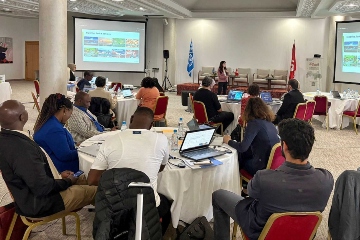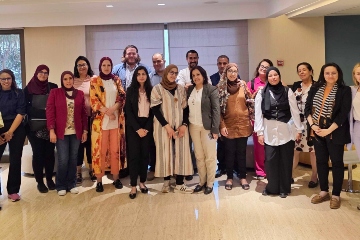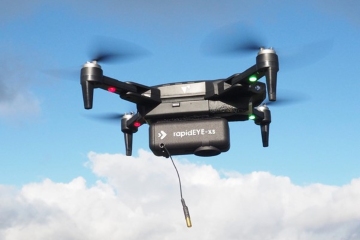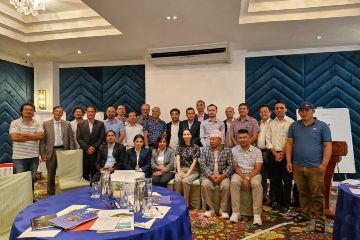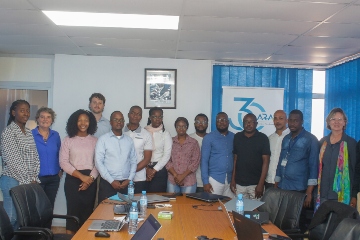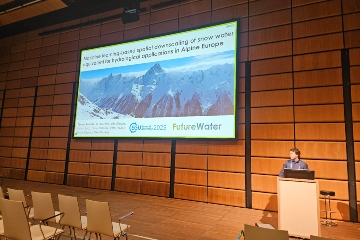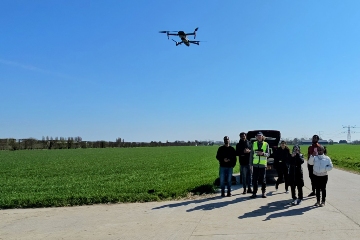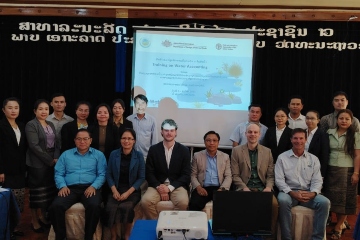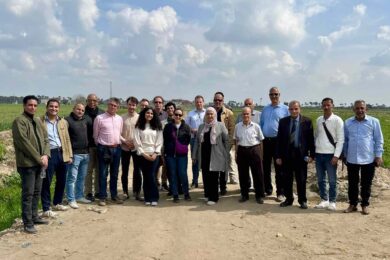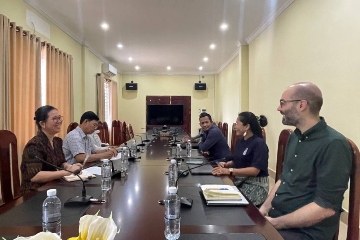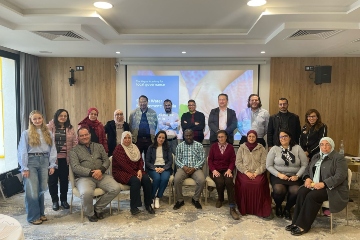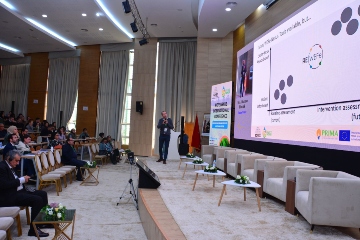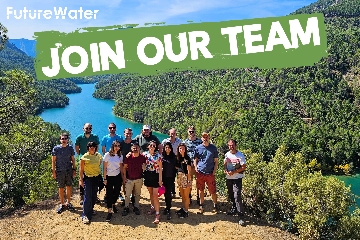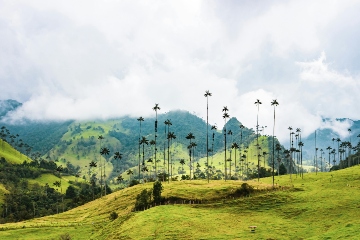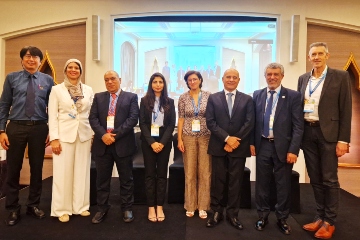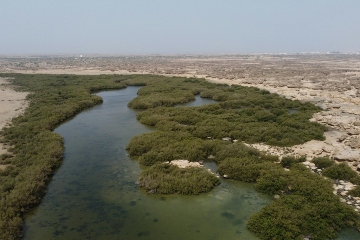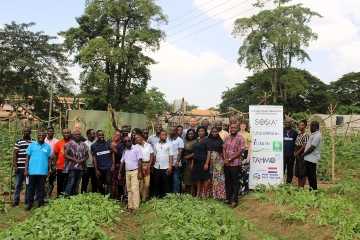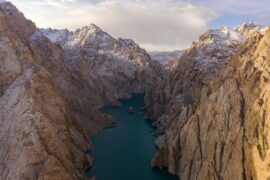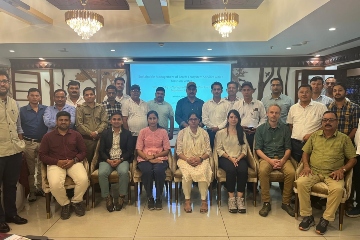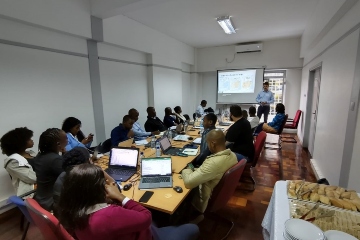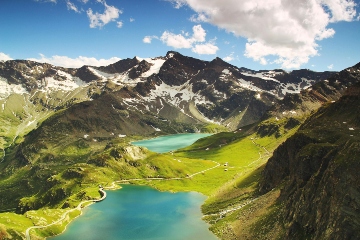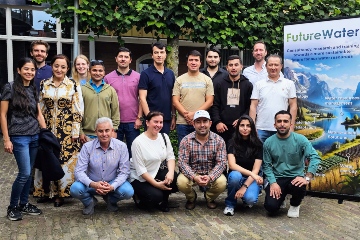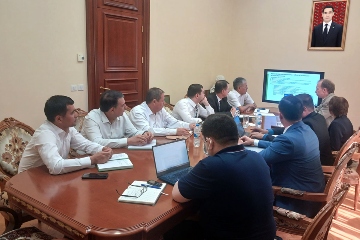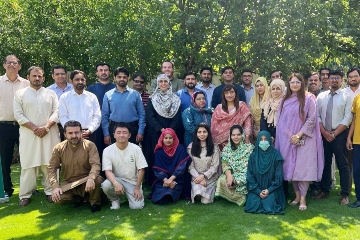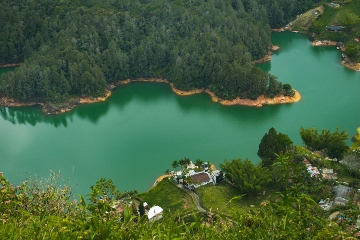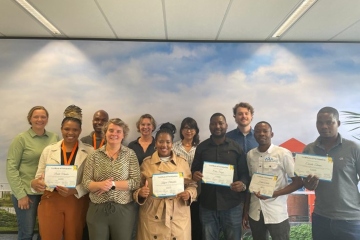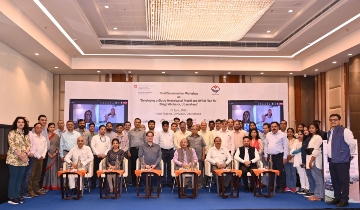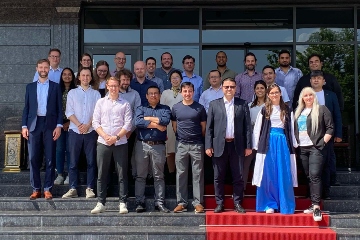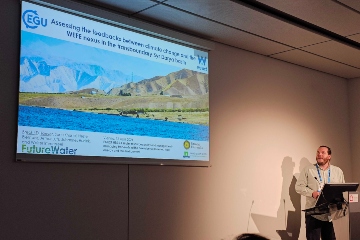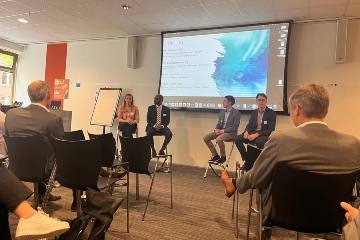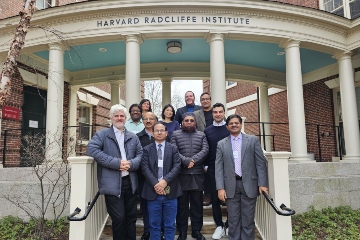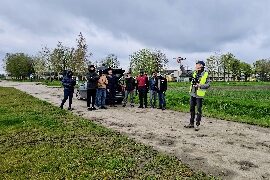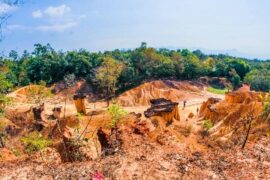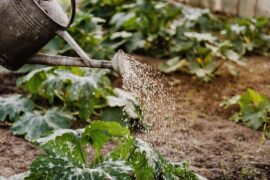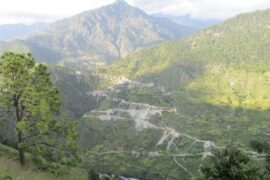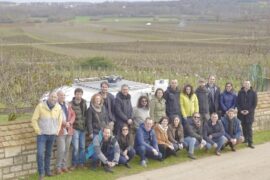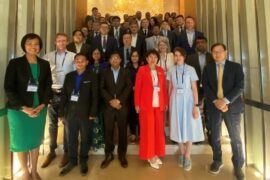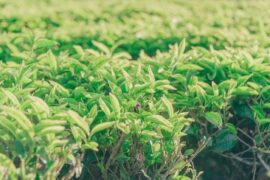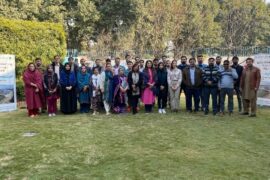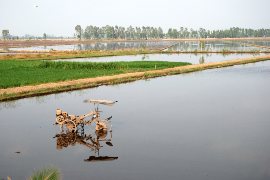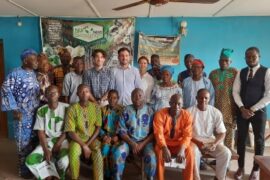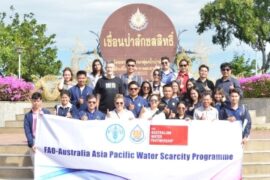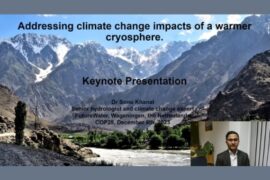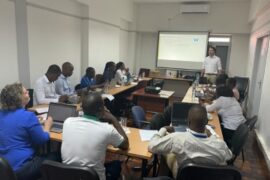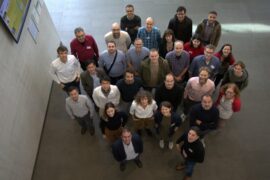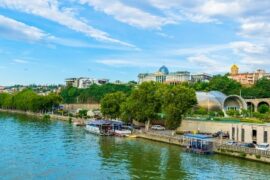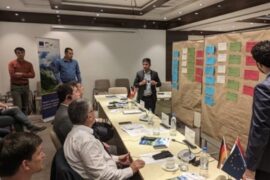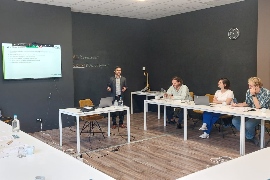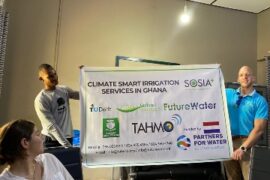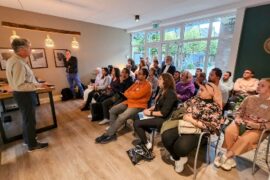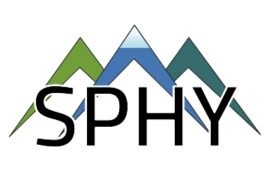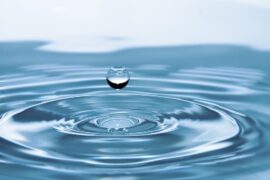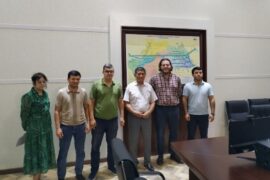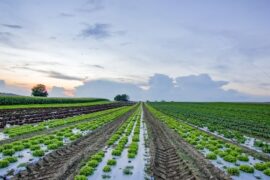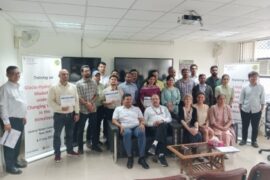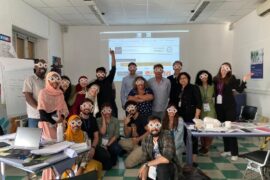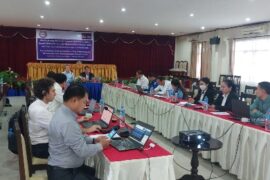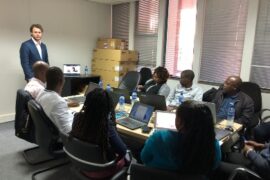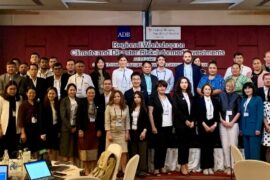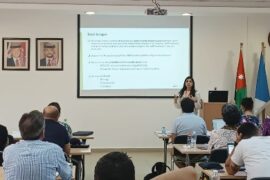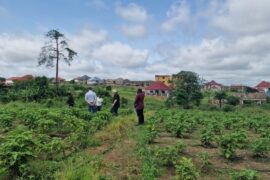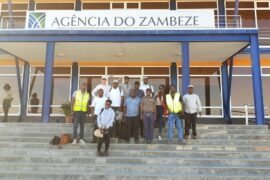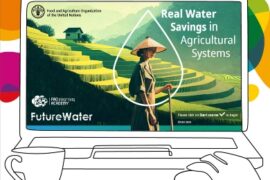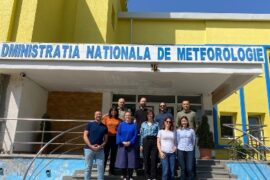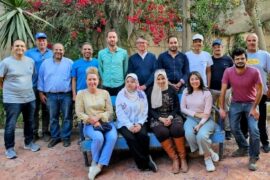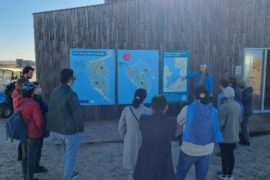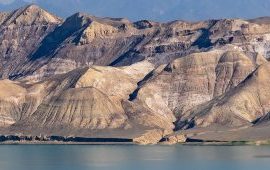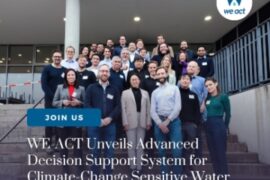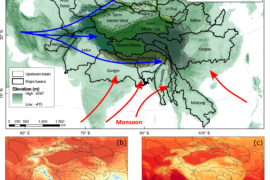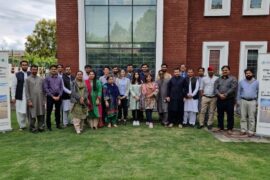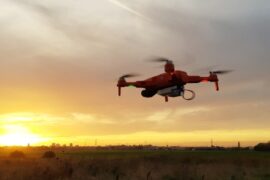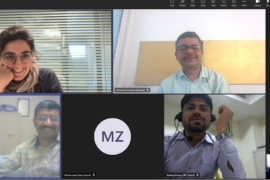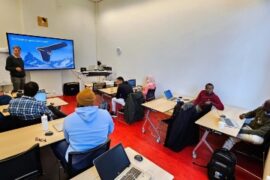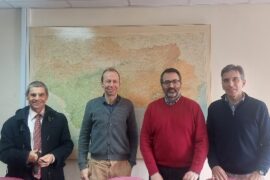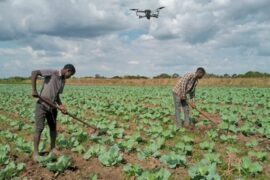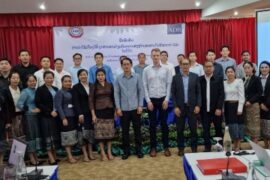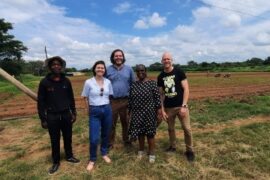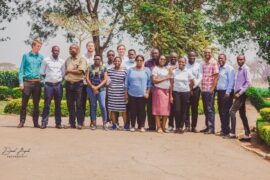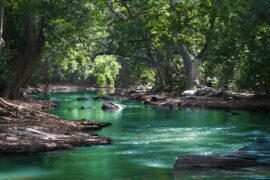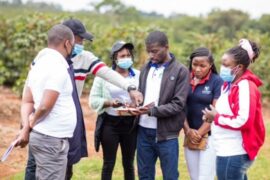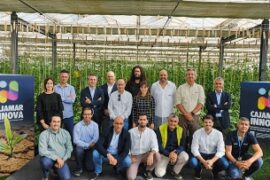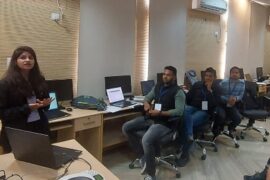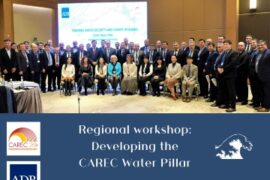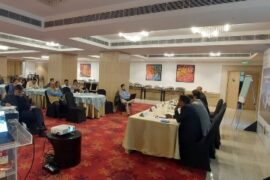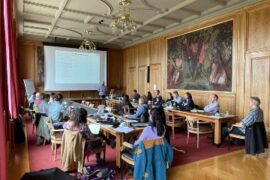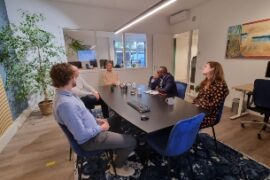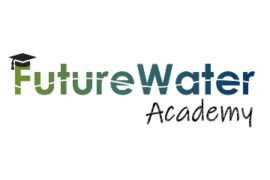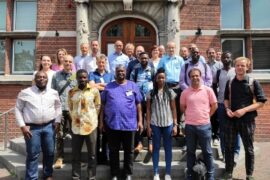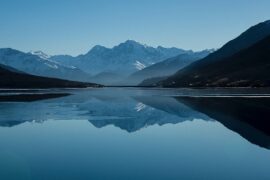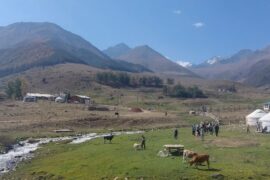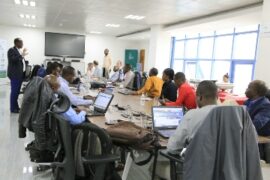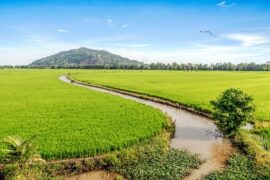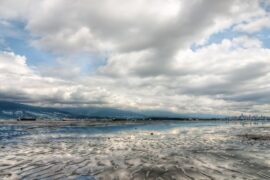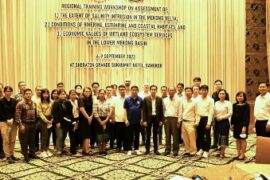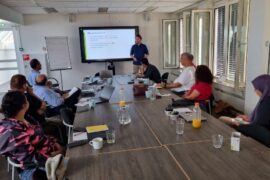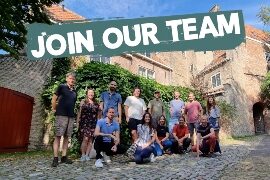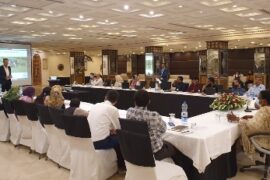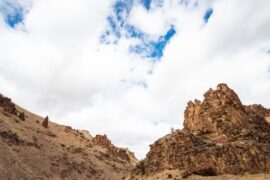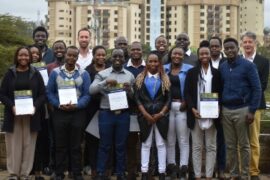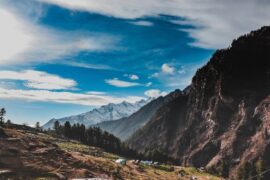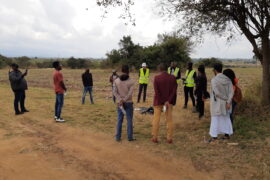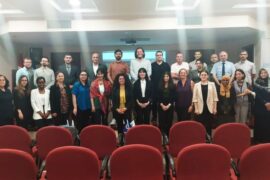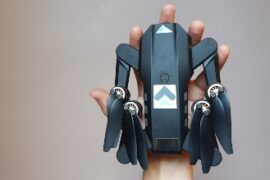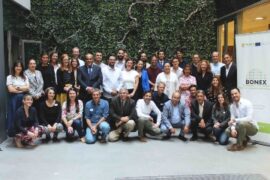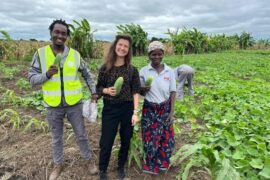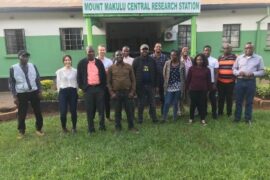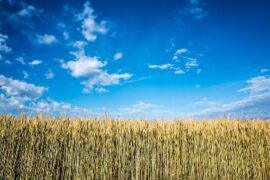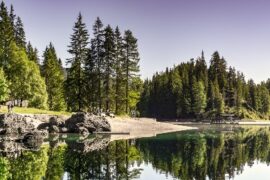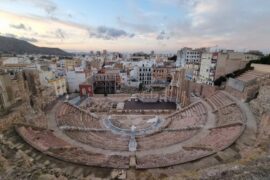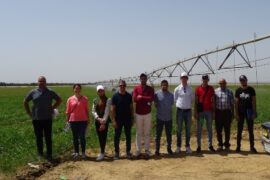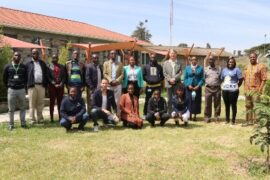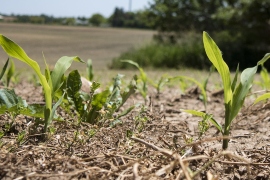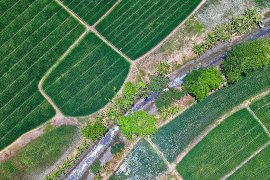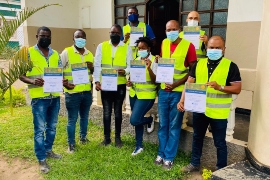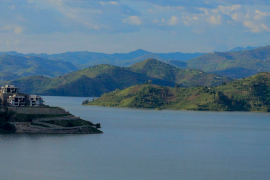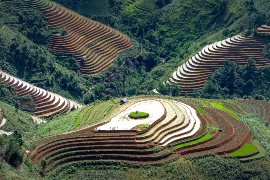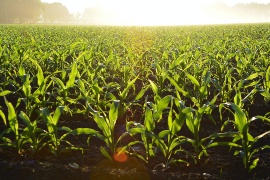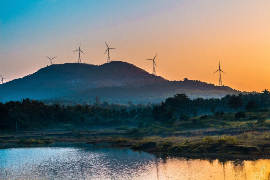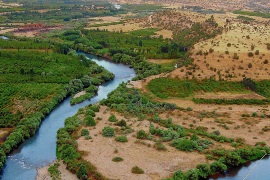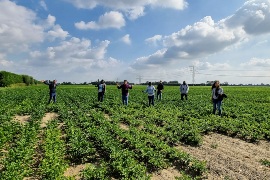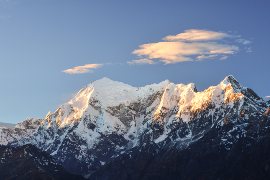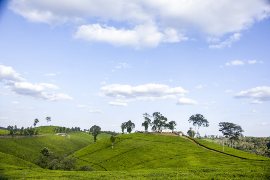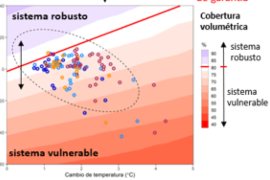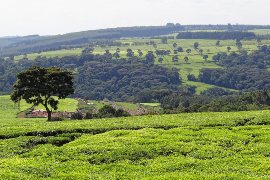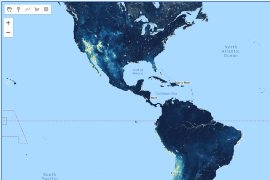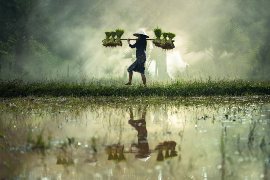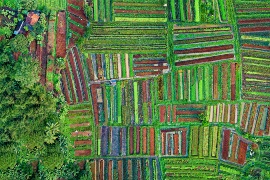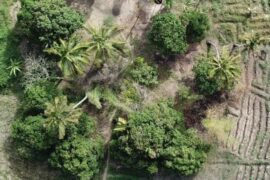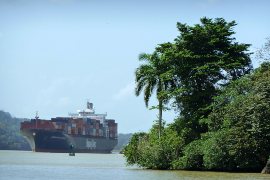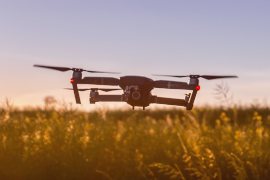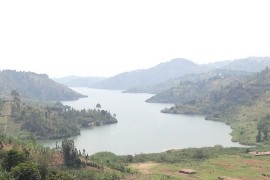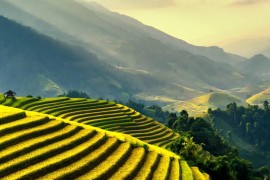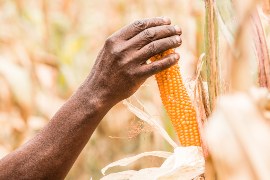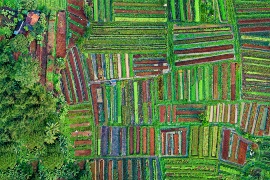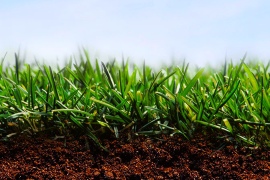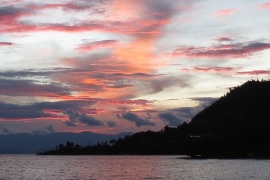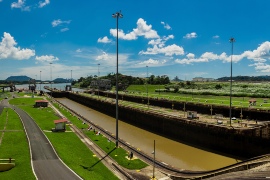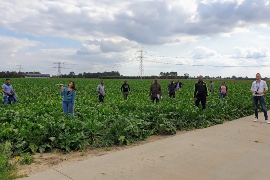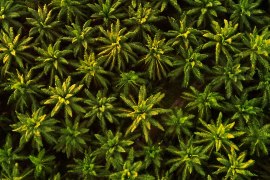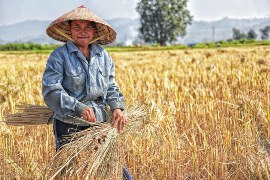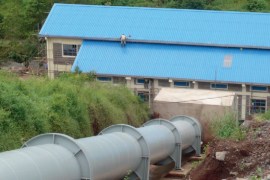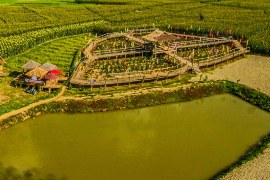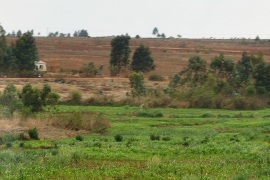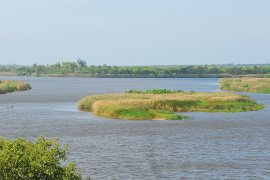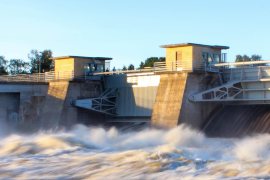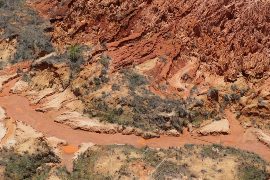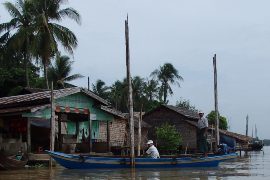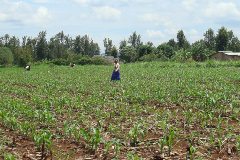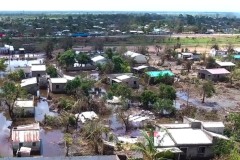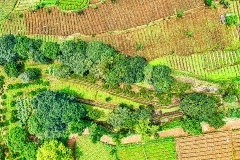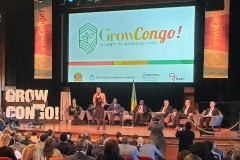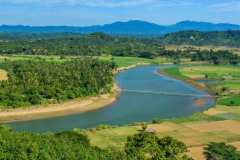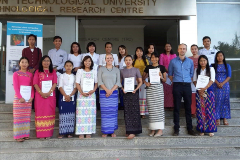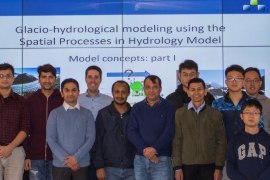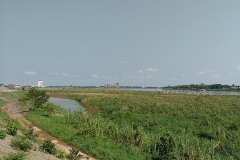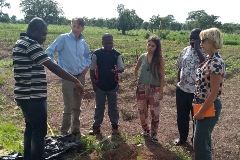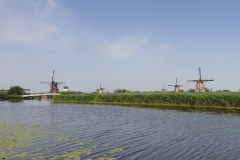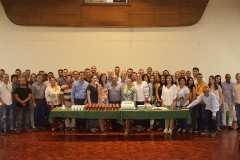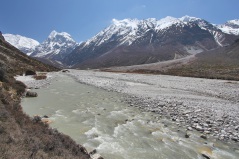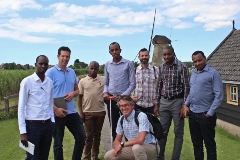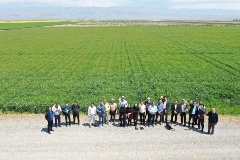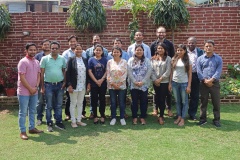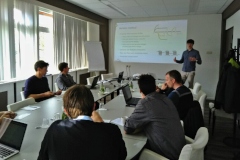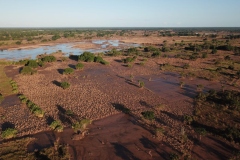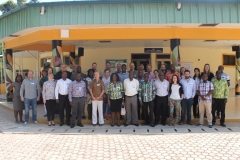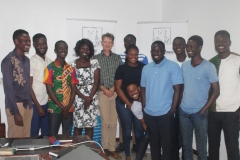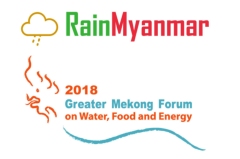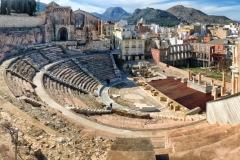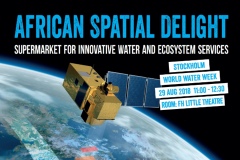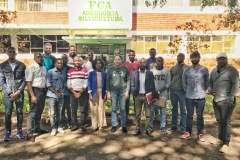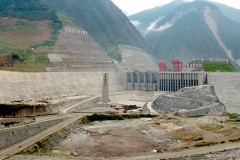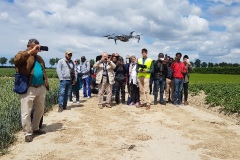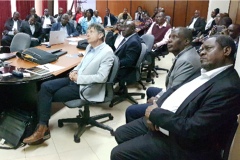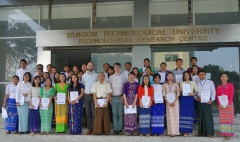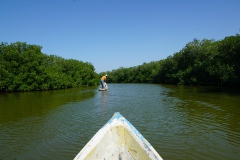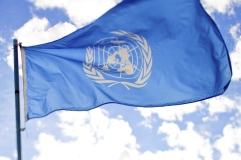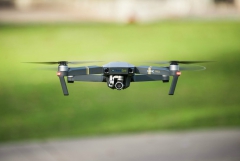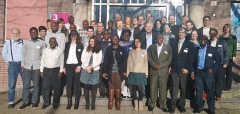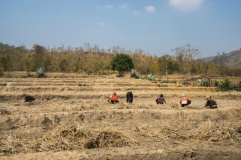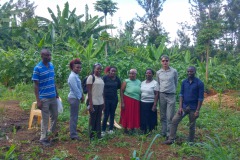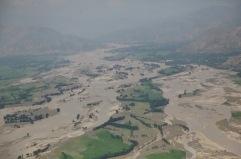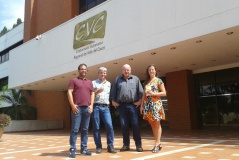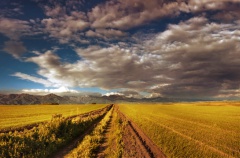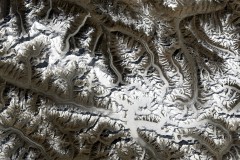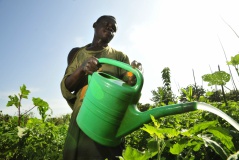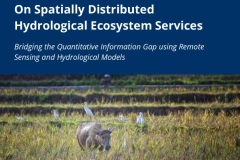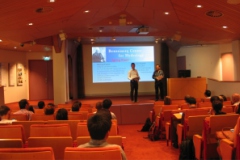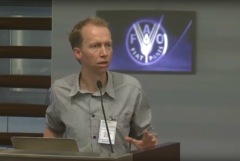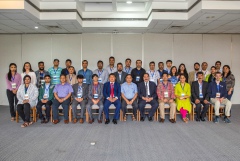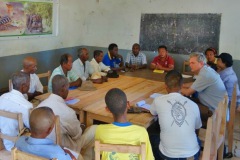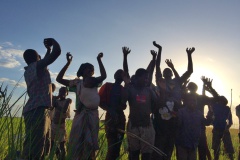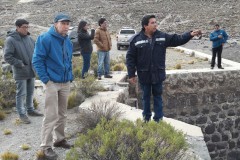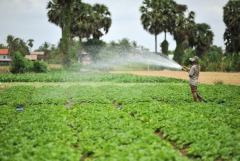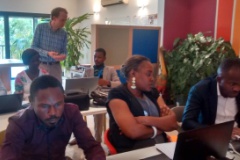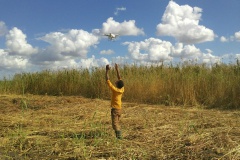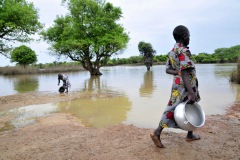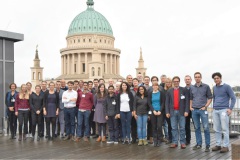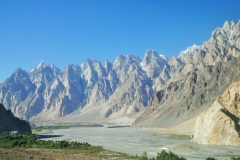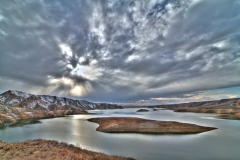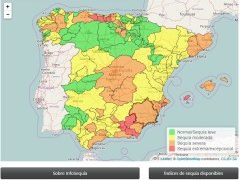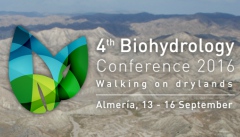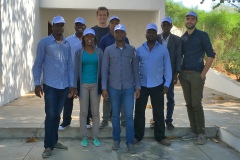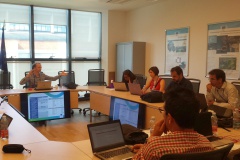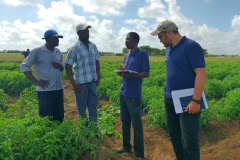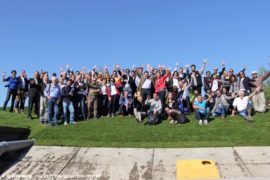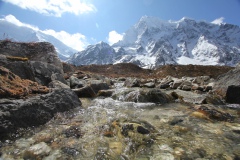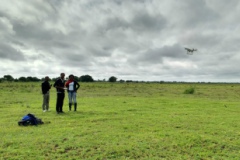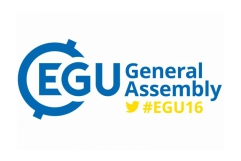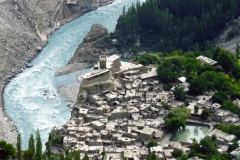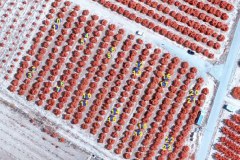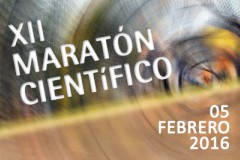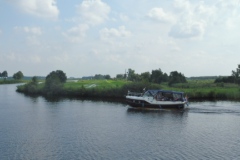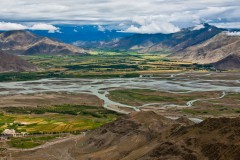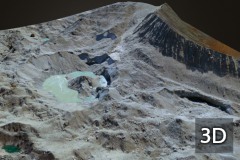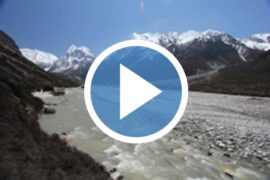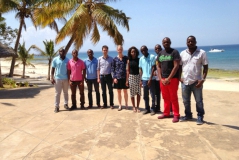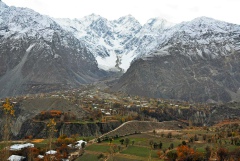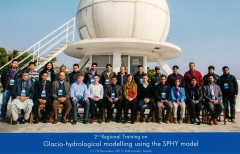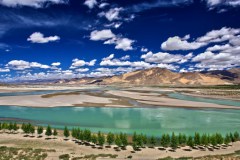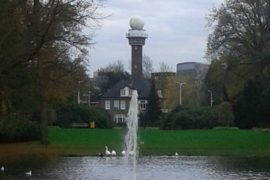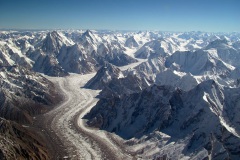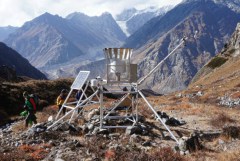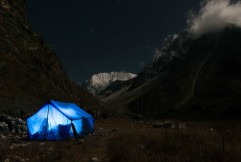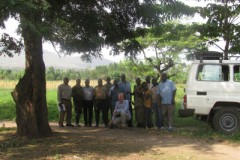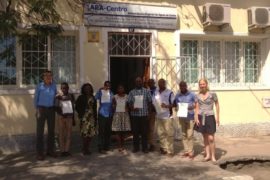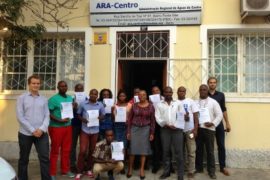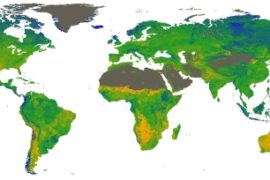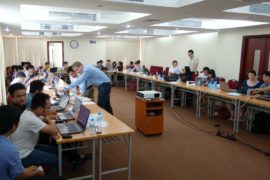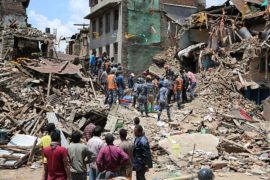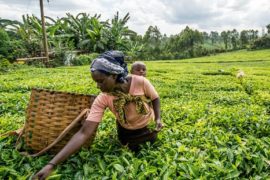10 July 2025
FutureWater Presents Blueprint of New Water Accounting Tool at FAO Interregional workshop in Tunisia
FutureWater, together with FAO’s regional office for the Middle East and North Africa, presented the blueprint of a new decision support tool at the FAO inter-regional workshop on “Integrated approaches and evidence-based good practices in sustainable land management to promote integration of the WEFE nexus”. The tool is designed to use water accounting data to...
1 July 2025
Shiraka Training Programme Successfully Concluded in Tunisia
FutureWater has successfully delivered the second part of the Shiraka training program on “Climate Smart Water in Agriculture”, in collaboration with The Hague Academy for Local Governance. The training was part of the Shiraka Programme, an initiative by the Netherlands Ministry of Foreign Affairs aimed at strengthening sustainable partnerships and knowledge exchange with MENA countries....
30 June 2025
We’re Live! Order Your Rapid Eye XS Now
We’re thrilled to announce that the Rapid Eye XS finally has its own home online: www.rapideyexs.com After years of testing, tweaking, and using it in the field, in collaboration with HiView, our very own near-infrared camera system is now available for anyone to order — straight from our new webshop. Whether you’re flying drones or...
25 June 2025
RoSPro Project Closure: National Workshop Highlights Positive Outcomes
On June 25, we celebrated the successful closure of the RoSPro project with a national workshop held in Nepal. The event brought together key stakeholders to reflect on the project’s positive outcomes, including improved spring water access, road resilience, and community engagement in water management. A key highlight of the project was the Decision Support...
16 June 2025
FutureWater Develops Water License Evaluation Tool for Mozambique
FutureWater has launched WE-HARP, a new tool to support water permitting decisions in Mozambique. Developed under the Blue Deal program, the tool was introduced during a training with ARA-Sul and is designed to make the licensing procedure more data-driven. In June 2025, Tijmen Schults visited ARA-Sul to support the development and roll-out of the tool....
13 May 2025
FutureWater at the EGU General Assembly 2025: Showcasing Advances in Snow Water Equivalent Downscaling
The European Geoscience Union (EGU) General Assembly, held from April 28th to May 4th, 2025, at the Austria Centre Vienna, brought together scientists and researchers from around the globe. FutureWater was proud to be a part of this event, presenting its latest work under the SOS-water EU Horizon project, which aims to define the Safe...
20 April 2025
Annual Flying Sensor Training at IHE Delft – From Classroom to Crop Field
For the sixth consecutive year, FutureWater, in collaboration with HiView, has delivered guest lectures at IHE Delft Institute for Water Education — a renowned postgraduate knowledge centre supported by the United Nations. This year, Martijn de Klerk and Jan van Til once again provided an in-depth course focused on the processing and analysis of aerial...
28 March 2025
Water Accounting Training Second Phase in Lao PDR: From Data Collection to Scenario Analyses
In early March 2025, the second phase of Water Accounting training under FAO’s Water Scarcity Program was held. The training focused on collecting and analyzing spatial data to build and simulate a water account. Participants from various governmental institutions worked with open-source datasets to compute seasonal water balances and assessed water availability and interventions in...
10 March 2025
BUCRA Project Launches in Egypt’s Nile Delta: Advancing Climate-Resilient Agriculture
FutureWater and its RVO Impact Cluster partners recently visited Egypt for the Building Unity for Climate Resilient Agriculture (BUCRA) project. The team assessed the demonstration farm in Qahbunah, a community in the northern Nile Delta. This farm will function as a pilot for innovative agricultural practices, showing the potential for more efficient and climate resilient...
7 March 2025
Enhancing Climate Resilience And Disaster Risk Reduction In The 3S and 4P Basins, Cambodia: From Studies To Action!
FutureWater just completed a successful mission to Cambodia, where UNDP Cambodia is implementing the project “Enhancing Integrated Water Management and Climate Resilience in Vulnerable Urban Areas of the Mekong River Basin”, funded by Ministry of Environment of the Republic of Korea. Since December 2022, FutureWater has supported UNDP with technical expertise to ensure swift and...
5 March 2025
Empowering Water Management: FutureWater’s REWEFe Training in Tunisia
FutureWater recently conducted a training session for the Ministry of Agriculture, Water Resources and Fisheries, Tunisia on Water Governance and the Water-Energy-Food-Environment (WEFe) Nexus. This training, held in Tunis, was part of the Dutch-funded Shiraka training program and was delivered in collaboration with The Hague Academy of Local Governance. The session aimed to equip stakeholders...
4 March 2025
New Tool for Exploring and Bridging Nexus Well Received at International WEFe Conference
The WEFE NEXUS International Conference, themed “Exploring and Bridging Nexus for a Sustainable Future,” was held on 11-12 February 2025 at the Institut Agronomique et Vétérinaire Hassan II in Rabat, Morocco. Jointly organized by the BONEX and SureNexus projects, both funded by PRIMA, this important event convened a diverse group of researchers, policymakers, entrepreneurs, and...
18 February 2025
Vacancy: Senior Hydrologist
0.8-1.0 FTE | Location: Wageningen, The Netherlands | Start date: TBD | Application deadline: 3 March 2025 About the Role FutureWater is seeking an experienced Senior Hydrologist to support our expanding international project portfolio, particularly in Asia and Africa. In this role, you will work at the interface of consultancy and research, contributing both technically...
7 February 2025
FutureWater at Colombia Water Platform Meeting
On the 28th of January our colleague Evelyn Aparicio Medrano as a panelist during the Colombia Water Platform Meeting. During the event, organized by Partners for Water, we shared our experience of working in Colombia. Particularly we guided the discussion under pilar 2 which refers to supporting and stimulating project implementation and continuation. FutureWater is...
22 January 2025
Highlights: International Soil and Water Forum 2024
The International Soil and Water Forum, organised by the Food and Agriculture Organisation of the United Nations, brought together over 500 participants from 55+ countries in Bangkok in December 2024. Shared experiences under the four thematic areas: i) managing water scarcity, ii) reversing land degradation and boosting land restoration, iii) sustainable soil management and iv)...
10 January 2025
World Bank’s Drought Risk and Resilience Assessment Methodology Includes NbS Dimension Provided by FutureWater
The recently published World Bank’s Drought Risk and Resilience Assessment Methodology (DRRA) is a framework for action to support governments proactively address drought risks. Drawing on international best practice in drought management, it outlines practical measures to build resilience at every stage of the drought cycle. With this tool, governments can create a community of...
5 December 2024
Training Agricultural Lecturers in Ghana on Smart Irrigation and Geodata Tools
Last month, Martijn de Klerk from FutureWater concluded a successful training program in Ghana, equipping agricultural lecturers with innovative tools and knowledge to advance smart irrigation and sustainable farming practices. In partnership with Bram de Vries from Holland Greentech and as part of the SOSIA+ project funded by the Netherlands Enterprise Agency (RVO), the program...
29 November 2024
Advancing Climate-Sensitive Water Management in the Syr Darya River Basin: WE-ACT Project Update
In the WE-ACT project at FutureWater, significant advancements are being made to improve climate-sensitive water allocation across the Syr Darya River Basin. This region faces complex challenges, including transboundary water issues and increasing climate impacts on water resources, which the project consortium addresses through advanced water modeling and decision-support tools. A key focus of the...
11 October 2024
Safeguarding Springs for the Future: Springshed Management in the Indian Himalayas
Springs in the Hindu Kush Himalaya (HKH) region are essential for water security, agriculture, economic activities, ecosystem services, biodiversity, and cultural heritage. They sustain nearly 240 million people, including 50 million in India who depend directly on these springs for their water needs. However, almost half of the perennial springs in the Indian Himalayan Region...
20 September 2024
GLOW Project Roadshow Highlights Water Security Innovation Across Southern Africa
Last two weeks, the GLOW project held a roadshow through Mozambique, Eswatini, and South Africa presenting the innovative water management solution GLOW to local stakeholders. By combining weather forecasts, hydrological, and water resource modelling, together with visualisation tools, the GLOW service addresses transboundary water challenges, enhances water security, and provides actionable water management advice in the...
15 September 2024
Researchers Gather to Launch Project on Understanding Impacts and Solutions for Megadroughts in Europe
The international research project on Megadroughts in Europe’s Watertowers (project acronym MegaWat) officially launched with a kickoff meeting at the Institute of Science and Technology Austria (ISTA) the 4th and 5th September 2024. The meeting brought together all project partners to discuss the research framework, methodologies, and collaborative goals. This project has received funding from...
30 August 2024
Empowering Tajikistan’s Water Specialists: Advanced Hydrological Modeling Tools Training in the Netherlands for Enhanced Water Management
As the UN kicks off the “International Year of Glaciers Preservation 2025” and the “Decade of Action for Cryospheric Sciences,” Tajikistan is taking center stage with tech-driven solutions and regional and global cooperation leading the way in water adaptation. In line with these global initiatives and ongoing project (Integrated Rural Development Project/TRIGGER), specialists from Tajikistan’s...
24 July 2024
Initial Discussions on Climate Adaptation Project in Turkmenistan
Early July, an Asian Development Bank (ADB) delegation and FutureWater visited Ashgabat for meetings and consultations with specialists from Turkmenistan’s Ministries of Agriculture and Environmental Protection, as well as the State Committee of Water Resources. The goal was to establish scientific and practical cooperation for a new climate adaptation-focused project. The proposed project focuses on...
9 July 2024
Capacity Building Program on Water Accounting Successfully Progresses in Pakistan
FutureWater, in collaboration with FAO Pakistan, has been implementing a hands-on training on Water Accounting under the GCF project titled “Transforming the Indus Basin with Climate Resilient Agriculture and Water Management”. Comprising of 7 modules, the capacity building program has been running since December 2023, with both online and in-country training sessions. The latest in-country...
8 July 2024
Showcasing our HERMANA service in Colombia at ACODAL 2024
FutureWater is proud to have participated in the 67th ACODAL Water, Waste, and Energy Congress & Exhibition held in Cartagena, Colombia. Alongside esteemed Dutch organizations, we showcased innovative water management solutions and engaged in knowledge exchange initiatives. Our collaborative efforts, particularly within the HERMANA Project, highlighted our commitment to addressing Colombia’s water challenges. This event...
5 July 2024
Mozambique and Eswatini Water Experts Enhance WEAP Modelling Skills with Training in the Netherlands
FutureWater recently concluded a two-week training program for the Blue Deal partnerships of Mozambique and Eswatini, aimed at enhancing the technical skills of water management professionals from ARA-Sul (Administração Regional de Águas do Sul), ARA-Norte (Administração Regional de Águas do Norte), and the Joint River Basin Authorities (JRBA) from Eswatini. For the training, six water...
13 June 2024
Capacity Enhanced On Glacio-Hydrological Modeling for the Indian Himalayan Region
FutureWater and TERI (The Energy and Resources Institute) with support from Swiss Agency for Development and Cooperation (SDC) organised a Final Dissemination Workshop under the project for “Developing a Glacio-Hydrological Model and IWRM Plan for Bhagirathi Basin, Uttarakhand” at Dehradun today. For the aspects of Integrated Water Resources Management (IWRM) in Uttarakhand, the SCA-Himalayas project...
2 June 2024
Advancing Water Management in Central Asia: Highlights from the WE-ACT General Assembly
The WE-ACT General Assembly, held in Tashkent, Uzbekistan from April 23rd to 24th, 2024 focused on advancing water management in Central Asia through keynote speeches, collaborative sessions, and innovative demonstrations. Notable moments include the introduction of serious games for interactive learning and decision making, and a visit from BWO SyrDarya and SIC ICWC, emphasizing the...
8 May 2024
PhD Proposal on Climate-Water Nexus in the Syr Darya Basin Unveiled at EGU in Vienna
Two weeks ago, Brecht D’Haeyer, a part-time PhD candidate at Utrecht University and full-time colleague at FutureWater, joined the annual EGU conference in Vienna, where he presented his PhD proposal to fellow researchers. Brecht commenced his PhD journey in March 2024 as an external candidate at Utrecht University, under the guidance of FutureWater and Wageningen...
6 May 2024
FutureWater Pioneering Nature-Based Solutions in the Asia-Netherlands Water Learning Week 2024
The Asian Development Bank, the Netherlands Water Partnership, and the Dutch Government hosted an intensive week-long programme that brought together 48 delegates from 12 project teams across 11 Asian participating countries and water experts from the Netherlands. The Asian and Dutch parties expanded their knowledge and shared experiences regarding Nature-based Solutions for cities, coasts, and...
2 May 2024
FutureWater Showcases Cutting-Edge Irrigation Solutions at Harvard Radcliffe Workshop
Early in April, FutureWater participated in a pivotal workshop hosted by the prestigious Harvard Radcliffe Institute. The workshop convened experts to explore water productivity issues in Bangladesh, particularly focusing on the challenges faced by coastal regions grappling with water scarcity and salinity. A key focus of discussion revolved around pioneering strategies aimed at bolstering resilience...
5 April 2024
Students Dive into Precision Agriculture during Flying Sensor Lectures at IHE Delft
This week, FutureWater, in collaboration with its partner HiView, conducted a two-day workshop at IHE Delft Institute for Water Education, which works in association with UNESCO. The workshop was part of the master’s degree program, with seven students receiving education on the theory of flying sensors (commonly known as drones), their various applications, and their...
3 April 2024
WEAP Erosion Plugin Developed by FutureWater Officially Included in Software
Soil erosion plays a critical role in soil and water conservation practices. Until recently, the WEAP model (Water Evaluation And Planning Tool), widely used for water resources planning assessments and scenario analyses, did not allow for the calculation of soil erosion. The WEAP Erosion plugin developed by FutureWater, fills this gap by allowing users to...
1 April 2024
SOSIA+: How to secure the future of farming in a changing climate in Ghana
This week a video was created from our partnership in the SOSIA+ project. The video showcases the collaborative efforts of the partners by addressing the question: “How to secure the future of farming in a changing climate in Ghana?” Through the innovative application of smart irrigation technology and advisory tools developed and piloted within the...
25 March 2024
Introducing Roadside Spring Protection to Improve Water Security (RoSPro)
This article is originally from Partners for Water For the first interview of the Innovation in Progress series, we speak to Saroj Yakami and Sanjeev Bhuchar. They are part of the team currently working in Nepal’s mountainous Dhankuta municipality and Chhathar Jorpati Rural Municipality of the Dhankuta district. The project aims to enhance natural springs while...
7 March 2024
MAGDA Project Hits Milestone in Beaune, France
This week marked a significant milestone for the MAGDA Project as the Mid-term Review Meeting was held in the city of Beaune, France. Over the course of two days, the consortium gathered to conduct a comprehensive assessment of the progress achieved during the first half of the project. Reflecting on past achievements, the gathering also...
26 February 2024
Regional Workshop on Increasing Investments in Early Warning Systems Held in Bangkok
FutureWater aims to support the Asian Development Bank (ADB) in the development of a new multi-hazard Early Warning System (EWS) facility, addressing the significant exposure to disaster risks of the developing member countries (DMCs). The enhancement of multi-hazard EWS aligns with global commitments, such as the Paris Agreement, Nationally Determined Contributions (NDCs), Sustainable Development Goal...
14 February 2024
Innovation in Progress: Unveiling the Co-created SOSIA+ Solution
This article is originally from Partners for Water Ghana, like many other Sub-Saharan African countries, is experiencing extreme drought and irregular weather patterns. These climate change challenges are expected to increase and require adaptation and mitigation measures. To adapt, farmers need localised, climate smart irrigation advice. TU Delft, FutureWater, Holland Greentech and TAHMO are making...
19 January 2024
Second Part of Training on Water Accounting Successfully Held in Pakistan
This week, the second part of the Water Accounting Training for the Agriculture, Climate and Water Sector Organizations in Pakistan has been successfully completed at the Food and Agriculture Organization of the United Nations (FAO) office in Islamabad, Pakistan. As an agrarian economy that heavily depends on water, it is crucial for Pakistan to adopt a more...
10 January 2024
FutureWater Develops a New Methodology for Mapping of Salinity Concentrations in the Mekong Delta
The latest Catch and Culture newsletter (pages 38-41), published by the Mekong River Commission Secretariat, features the pilot results of a new methodology for mapping of salinity concentrations (SIM) in the Mekong Delta. The method relies solely on satellite imagery and was developed and applied by FutureWater to support the 2023 MRC State of the...
18 December 2023
Nature-based Solutions for Nigeria
Our resident Nature-based Solutions expert, Jack Beard, recently travelled to Nigeria to gather evidence to inform a forthcoming pre-feasibility assessment of the potential to develop the country’s first Watershed Investment Programme (WIP). This project is one of a growing number of engagements FutureWater is supporting for the Nature for Water Facility – an organisation seeking...
15 December 2023
FutureWater Successfully Completes the Capacity Building Program on Water Accounting in Thailand Under FAO’s Water Scarcity Program for Asia-pacific
The second Water Accounting training under FAO’s Water Scarcity Program took place from 13 – 18 November in Bangkok. Participants from various governmental departments and academic institutions gained practical experience in utilizing different geospatial and water resources modeling tools for developing a water account. As part of the Water Scarcity Program (WSP), FutureWater designed and...
11 December 2023
FutureWater Delivered a Keynote Speech on the Role of Cryosphere in the Warming Climate at COP28
Tajikistan showcased leadership in climate resilience at COP28, organizing a session titled “Are we adapting? Integrating WEFE Nexus and climate services for effective climate change adaptation” on December 6, 2023, from 13:30 to 15:00 at the Tajikistan Pavilion (B2-18) in the Blue Zone of COP28, Expo City Dubai, UAE. This event brought together a diverse...
30 November 2023
FutureWater Supporting Water Authorities in Mozambique: ARA-Norte and ARA-Sul Training
FutureWater recently completed a visit to Mozambique, collaborating with the regional water authorities in both the north (ARA-Norte) and south (ARA-Sul). The visit was part of the Blue Deal Mozambique program aiming to strengthen the cooperation between the Dutch and Mozambican water authorities. Additionally, the mission supported the GLOW Project funded by the Partners for...
9 November 2023
Celebrating Success and Innovation: SOS-Water’s General Assembly Meeting
Utrecht University held the 13 Month SOS-Water General Assembly Meeting, which took place on the 17th and 18th of October. This two-day gathering included presentations on how work packages had been progressing and interesting discussions on how to move forward to meet the project’s objectives. FutureWater actively participated in group discussions, guided by experts from...
6 November 2023
Stakeholder Consultations Held on Adaptation and Investment Planning, Georgia
Together with the Asian Development Bank, FutureWater visited and consulted ministries and other stakeholders in Tbilisi, Georgia. The objective was to get buy-in on the approach, present preliminary results, and identify gaps and scope for expanding the climate change assessment. Initial ideas on possible adaptation portfolios were presented, and priorities were discussed. The next step...
6 November 2023
FutureWater-led Consortium Visited Tajikistan for the Water Sector Reformation
Last month, FutureWater, in partnership with Utrecht University and University of Friborg, embarked on a transformative mission to Dushanbe, Tajikistan, aimed at assisting the Tajik government with the Water Sector Reform Program. This crucial program endeavors to enhance water resource planning and allocation strategies across various river basin zones. The necessity for such initiatives has...
18 October 2023
SPHY Webinar 2023 – A Resounding Success!
Last Tuesday was a fruitful day for the SPHY community as FutureWater (FW) with support from Utrecht University (UU) and Centre for Applied Soil Science and Biology of the Segura (CEBAS) and Wageningen University (WUR) hosted the SPHY Webinar 2023. We were thrilled with the large turnout, both from those who joined us in Wageningen...
9 October 2023
Empowering Ghanaian Farmers Through Innovative Irrigation: The SOSIA+ Project
For the development of SOSIA+, a smart irrigation tool tailored to small-scale commercial farmers, FutureWater joined forces with Holland Greentech, TU Delft, Stichting TAHMO, and the Kwadaso Agricultural College (KAC). The project is co-funded by Netherlands Enterprise Agency (RVO) partners for water. The SOSIA+ project aims to optimize irrigation practices through the use of satellite...
21 September 2023
FutureWater and HiView Deliver Informative Training on Remote Sensing and Climate Smart Agriculture
Last week FutureWater and HiView collaborated to provide a valuable training session focused on Remote Sensing and Climate Smart Agriculture. This event took place at the FutureWater office and was an integral part of the Shiraka Training Programme (STP) coordinated by The Hague Academy for Local Governance. Participants from the MENA region gained practical insights...
11 September 2023
Invitation: SPHY Webinar on 10 October 2023
On Tuesday 10 October 2023 FutureWater presents the much-anticipated SPHY Webinar 2023. This event offers a unique platform for professionals and enthusiasts engaged with the Spatial Processes in Hydrology (SPHY) model to engage in in-depth discussions on recent advancements, transformations, and public engagement initiatives related to SPHY. About SPHY The SPHY model is a versatile...
4 September 2023
Exploring Water Challenges and Solutions at Stockholm World Water Week
Stockholm World Water Week organized by the Stockholm International Water Institute (SIWI), witnessed active participation from various stakeholders last month. Among them, Brecht D’Haeyer, a dedicated volunteer and representative of FutureWater, contributed significantly to the event’s success. Brecht played a crucial role in ensuring the smooth execution of the intensive week, which featured over 300...
9 August 2023
Fruitful Visit of FutureWater to Uzbekistan for the WE-ACT Project on Water Allocation in a Transboundary Basin
From June 19 – 30, FutureWater visited the IWMI Regional Representative Office for Central Asia in Tashkent as part of the Water Allocation Modelling within the WEACT project. The objective of this research visit was to gain insights into the water-related challenges under climate change and identify potential approaches to address these issues as well...
4 August 2023
FutureWater Releases Key Findings of Comprehensive Climate Risk Study on Crop Production in Turkey, Egypt, and Morocco
FutureWater proudly presents the culmination of an extensive study on climate risk assessment for key crop production in Turkey, Egypt, and Morocco. The report is a significant contribution to the CREATE project (Cross-Border Climate Vulnerabilities and Remote Impacts of Food Systems of the EU, Turkey, and Africa), funded by the European Research Area Network (ERA-Net)...
10 July 2023
Training Program on ‘Glacio-Hydrological Modelling under a Changing Climate in the Himalayas’ for Central Water Commission, Delhi, India
In support of climate change adaptation actions in the Himalayan region, the Swiss Agency for Development and Cooperation (SDC) is collaborating with multiple partners at national and sub-national levels through the “Strengthening Climate Change Adaptation in the Himalayas (SCA-Himalayas)” project. The aim of this project is to enhance institutional capacities across the Indian Himalayan Region,...
30 June 2023
FutureWater Provides Trainings on Nature- and Culture-based Solutions for Water Management
In April, FutureWater supported the International Centre for the Study of the Preservation and Restoration of Cultural Property (ICCROM) in delivering a programme to help support five place-based projects in Sudan, Egypt, India, Brazil and Uganda. These projects aimed to use the historical and cultural stories of specific places to find out how traditional knowledge...
28 June 2023
Laos’ Capacity Strengthened to Use Climate and Disaster Risk Information Tools
The Asian Development Bank with support of FutureWater delivered a workshop on climate and disaster risk information tools in Laos. Several sector-focused training sessions were provided to ministry officials engaged in food security (19 June) and housing and transport (20 June). The training programme will be followed up by a hands-on training on the application...
26 June 2023
FutureWater Empowers Water Resource Planning in Mozambique: Ara-Sul Receives WEAP Training
In June, FutureWater visited Mozambique for a training session on the Water Evaluation And Planning (WEAP) model. The training was held at the Mozambique Regional Administration of Waters in the South (ARA-Sul) based in Maputo and was funded by the Blue Deal programme of the Dutch Water Authorities. The training on the WEAP model comprised...
23 June 2023
Asian-Pacific Countries Gather for Workshop on Climate and Disaster Risk-informed Investments
FutureWater supported the Asian Development Bank with the organization of a regional workshop on climate and disaster risk-informed investments, which was held in Bangkok on 22-23 June. The objective of the workshop was to foster the integration of climate and disaster risk information into development agendas, to enhance resilience, ensure sustainability of development investments, and...
16 June 2023
FutureWater Presents a New Tool to Quantitatively Assess the WEFe Nexus at the First Annual Meeting of BONEX in Jordan
The first annual meeting of BONEX took place from 30 May – 1 June in Jordan where all consortium partners came together to present their progress, highlight challenges and outline the next steps. The project aims to promote the practical implementation of water, energy, food and ecosystem (WEFe) nexus through context-adapted technological innovations across seven...
12 June 2023
Fruitful Visit of FutureWater to Ghana for the SOSIA+ Project to Start Irrigation Advisory Field Trials
In May, FutureWater joined TU Delft, Tahmo and Holland Greentech for a trip to Ghana for the SOSIA+ project. During this week, the team further developed the dashboard and irrigation service, refining the dashboard’s usability, expanded crop choices, and optimized the layout. The team presented demonstrations to the irrigation engineers of Holland Greentech in both...
9 June 2023
Revolutionary Flying Sensor Training Empowers Agricultural Advancements in Mozambique’s Zambeze Valley
In a groundbreaking development, FutureWater and HiView successfully completed a comprehensive flying sensor training program for the Agency for Development of the Zambeze Valley (ADVZ) in early May. The ADVZ, a government agricultural institute providing assistance and advisory services to farmers across the vast Zambeze Valley, received training from ThirdEye Mozambique, a local drone company...
7 June 2023
FutureWater Launched Its What-to-Plant Application for Farmers in Angola
Over the last months, FutureWater developed and launched its What-to-Plant application for the Mavo Diami project in Angola. The What-to-Plant service from FutureWater provides planting advice to farmers for the upcoming crop season, so that farmers can anticipate on which seeds to buy. The consortium will continue with keeping services operational so it can be...
31 May 2023
FutureWater Course on Real Water Savings Now Available in the FAO E-learning Academy
In the context of the global water shortages and challenges for water savings in agricultural systems, this course introduces interventions and tools, and more specifically the real water savings in agricultural systems (REWAS) project, that aims to provide practical guidance on the implementation of real water savings. Text from FAO elearning Academy website. Audience This...
29 May 2023
Romania Holds Preliminary Design Review Meeting for MAGDA Project, Setting the Stage for Further Progress
On May 22-23, FutureWater attended the Preliminary Design Review Meeting (PDR) for the MAGDA project in Bucharest, Romania. The meeting was hosted by the National Meteorological Administration, and it was a great opportunity for project partners to meet in person and present the latest achievements. The major outputs from the first six project months were...
24 May 2023
FutureWater Presents Climate-Smart Agriculture Solutions at the El-Wadi Exhibition in Egypt
Last week, FutureWater joined a Dutch delegation to the El-Wadi Exhibition on climate and water smart agriculture in Upper Egypt. During the five-day mission, we presented our expertise and tools to help farmers prepare for the future. On the first day of the mission, we visited two large agricultural sites to learn about current farming...
18 May 2023
Completion of Tailor-made Group Training on Building Data-driven Capacity for Ecosystem Services and Management in Iran
Funded by Nuffic as part of the Mena Scholarship Programme and requested by The Center for Conservation and Development of Sustainable Ecosystems (ZIPAK) in Iran, the training focused on providing participants with relevant hands-on experience in tools and techniques to enhance their capacity to manage (protected) ecosystems in Iran. Over the course of 10 days,...
11 May 2023
New World Bank Report Higlights Land Restoration Opportunities in the Naryn River Basin, Kyrgyz Republic
The Kyrgyz Republic is one of the countries in Central Asia most vulnerable to land degradation and climate change impacts. Climate-related disasters and land degradation due to unsustainable land use practices already affect the rural and urban population, which depends on natural resources and critical infrastructure. The World Bank has just released a report outlining...
28 April 2023
FutureWater Joins New EU Project Set to Catalyze the Shift to Climate-sensitive Transboundary Water Allocation and Management in Central Asia
The WE-ACT project, backed by the European Commission, is on a mission to revolutionize the allocation of water resources across borders by using digitalization tools for inclusive, forward-looking and climate risk-informed water allocation planning and management processes. In January, FutureWater joined the kick-off of the Horizon Europe funded WE-ACT (Water Efficient Allocation in a Central...
14 April 2023
New Study Led by FutureWater Shows That High Mountain Asia Faces Acute Climate Change Issues
High Mountain Asia (HMA) serves as a major water source for large rivers in Asia. HMA consists of the Tibetan Plateau (TP), surrounded by the mountain ranges of Tien Shan, Pamir, Hindu Kush, and the Karakoram in the west, the Himalayas in the south and southeast, and Qilian Shan in the east. Over 1.4 billion...
4 April 2023
Training on Water Accounting Successfully Held in Pakistan
Last week, the first part of the Water Accounting Training for the Agriculture, Climate and Water Sector Organizations in Pakistan was successfully completed at the Food and Agriculture Organization of the United Nations (FAO) office in Islamabad, Pakistan. This training has been designed by FutureWater and FAO as part of the Green Climate Fund funded...
15 March 2023
FutureWater and HiView Provide Flying Sensor Acquisition and Training in Mozambique
FutureWater and HiView will provide the Agência de Desenvolvimento do Vale do Zambeze (ADVZ) in Mozambique with a dozen of new ‘Rapid Eye XS’ drone systems, as well as DJI Mavic 3 Enterprise NDVI systems. These will be used for extension services to farmers in the Zambezi Valley. Also, FutureWater and HiView will provide a...
9 March 2023
Virtual Training Session on ‘Glacio-Hydrological Modeling’ for Central Water Commision (India)
For the operationalization of climate change adaptation actions in the Himalayan region, the Swiss Agency for Development and Cooperation (SDC) supports multiple partners at the national and sub-national level through the project “Strengthening Climate Change Adaptation in the Himalayas (SCA-Himalayas)” to enhance the institutional capacities across the Indian Himalayan Region to plan, implement and mainstream...
8 March 2023
FutureWater and HiView Give Lectures on Precision Agriculture with Flying Sensors
This week FutureWater, together with its partner HiView, gave two days of lectures at IHE Delft Institute for Water Education, which partners with UNESCO. As part of their master degree, seven students were taught on the theory behind flying sensors (also known as drones), the different types of applications and how to use them in...
7 March 2023
First Prototype of the New Water-Energy-Food-Ecosystem Nexus Tool Ready for Testing
For the BONEX project, FutureWater visited the project partner University of Cordoba (UCO) to discuss the joint development of the enhanced Water-Energy-Food-ecosystem tool, based on the REWAS tool that was co-developed with FAO. The team of hydro-economists from UCO presented their recent research and developments in the project. Johannes Hunink presented the first prototype of...
3 March 2023
Significant Increases in Water Productivity for Smallholder Farmers in Mozambique
FutureWater successfully completed the APSAN-Vale project in Mozambique, together with it’s partners Resilience BV, HUB and ThirdEye Mozambique. This project aimed to increase climate resilient agricultural productivity and food security, by increasing the water productivity and profitability of smallholder farmers in three areas in Mozambique: Báruè, Moatize, and Nhamatanda. The project prioritized small family sector...
24 February 2023
Capacity Training on Using Climate and Disaster Risk Information Tools for Enhanced Decision Making in Lao PDR
FutureWater in collaboration with the Asian Development Bank provided training on Climate and Disaster Risk Information Tools for Enhanced Decision Making from 14-15th February 2023 at Luang Prabang province in Laos. Climate change and disaster risks present a serious and growing threat to sustainable development in Asia and the Pacific. ADB’s developing member countries, such...
22 February 2023
SOSIA Project Successfully Completed after Insightful Field Visits in Zambia and Rwanda
“How long do you irrigate per day?” we asked Madame Christine, a small-holder farmer with an eye for business. “Well, I used to irrigate for up to three hours every day, but not anymore. I can now double my fields under cultivation and sell more crops while using the same amount of water!” We received...
19 January 2023
Tailor-made Training on Geospatial Data Skills Successfully Completed in Zambia
Solidaridad and FutureWater partnered to conduct a tailor-made training on ‘Geo-spatial data skills development for improved soil water management and enhanced crop productivity at the national level in Zambia’. The training project for the Zambia Agricultural Research Institute (ZARI) was a Tailor-Made Training (TMT), as part of the Orange Knowledge Programme, funded by Nuffic, and...
22 December 2022
FutureWater Partners with the Nature for Water Facility
Over recent months, FutureWater has begun working with the Nature for Water facility to provide technical support to the development of watershed investment programmes globally. The facility aims to provide technical assistance to local “champions” who are developing Watershed Investment Programmes (or Water Funds) in their respective catchments. The facility aims to expedite the delivery...
20 December 2022
HiFarm Project Successfully Completed in Kenya
This month the HiFarm project, a data driven agricultural intensification pilot program for maize, coffee and tea farmers in Kenya, was completed. The 18-month project improved farmer productivity whilst enhancing the environmental risk management and climate resilience of 60 lead farmers through improved soil and crop nutrition management. Over the past years FutureWater, leading company...
15 December 2022
InfoSequia is part of the “Cajamar-INNOVA” Incubation Programme
InfoSequia, the Drought and Early Warning System (DEWS) developed by FutureWater, was granted for being part of the Cajamar-INNOVA Incubation Programme powered by Cajamar Fundation. InfoSequia has been granted by Cajamar-INNOVA, a High-Tech Incubator/Accelerator focused on the Water and Agro sector. During the 6-month granted period, FutureWater’s staff is being mentored and supported by experts...
7 December 2022
Training on Integrated Water Resources Modelling Completed in India
FutureWater and project partners organized a training programme on “Integrated Water Resources Modelling under a Changing Climate in the Indian Himalayas”, from 21-24 November 2022 at National Institute of Hydrology (NIH), Roorkee by Swiss Agency for Development and Cooperation (SDC), New Delhi in collaboration with NIH. To promote water security in Himalayan states of India,...
5 December 2022
FutureWater Attends Regional Workshop on Water Pillar in Uzbekistan
On November 29-30, FutureWater participated and supported the organization of the Regional Workshop on Establishing the CAREC Water Pillar, in Tashkent, Uzbekistan. The Regional workshop served as a platform to discuss regional cooperation project activities that respond to the needs of the region where demand for water is increasing amid climate change, natural disasters and...
2 December 2022
Stakeholder Meeting on Glacio-hydrological modelling successfully held in Uttarakand, India
A stakeholder meeting on Glacio-hydrological modelling and IWRM planning for a sub-basin in Bhagirathi Basin, Uttarakhand was organized on 25 November, 2022 by FutureWater and project partners, in collaboration with the Swiss Agency for Development and Cooperation (SDC) and the Government of Uttarakhand in Dehradun. SDC, as part of its strategy on climate change adaptation,...
29 November 2022
FutureWater Shared Insights on the Performance of Global Gravity-based Groundwater Product in Zurich
Early September at the Global Gravity-based Groundwater Product (G3P) General Assembly in Zurich, FutureWater, along with 11 other consortium partners, gathered to present scientific results, project milestones, and discuss the way forward. For context, the G3P product monitors groundwater storage changes with global coverage at a monthly resolution (2002 – present) through a cross-cutting combination...
25 November 2022
Fruitful Visit of Agência de Desenvolvimento do Vale do Zambeze to FutureWater
Early November Agência de Desenvolvimento do Vale do Zambeze (ADVZ) from Mozambique visited the FutureWater office in Wageningen, the Netherlands where a full day was planned with APSAN-Vale project partners Resilience, FutureWater and HiView. From FutureWater side Tijmen Schults and Lisa Verschuren provided an interesting presentation on the water productivity results of the passed season....
17 November 2022
FutureWater Academy Training Platform Launched
In response to the pressing global challenges related to water, agriculture and ecosystem services, the availability of data and tools to support decision makers in these fields has grown rapidly in recent years. Public agencies, NGOs and researchers therefore need to continuously develop their capacity to make optimal use of these resources. To support our...
3 November 2022
FutureWater Presented Two New Services at the TWIGA Final Conference
The TWIGA Final Conference was held on 11 and 12 July as a hybrid event in De Oude Bibliotheek in Delft, the Netherlands, and online. The event gathered on both days 27 participants present in person and 15 online, including consortium partners, representatives of two sister projects AfriCultuReS and e-Shape, Advisory Board members, and the...
4 October 2022
Towards a Safe Operating Space for Water Resources in a Changing Climate and Society
Starting on the 1st of October, 2022, the SOS-Water Project, funded under the Horizon Europe scheme, will create a holistic and participatory assessment framework of a Safe Operating Space (SOS) for the entire water resources system to inform global and regional water management policies and pathways. Water resources around the globe are under increasing stress....
3 October 2022
Opportunities for Regional Cooperation and Water Resilience in Central Asia Identified
Early September, FutureWater supported the Asian Development Bank in an extensive consultation of key stakeholders of the five countries in Central Asia, on possible activities to be integrated in the CAREC Water Pillar: an investment vehicle for regional cooperation and climate resilience for the region. Many physical meetings took place with the key ministries involved...
30 September 2022
Strategic Water Resources Options Prioritized for Rwanda
FutureWater and the Rwandan firm and consortium partner ENTREM presented interim results of the Integrated Strategic Water Resources Planning and Management project. The key objective of this study is to support the country on its path towards sustainable development towards 2050 by identifying strategies to better regulate and manage the available water resources through natural...
26 September 2022
Training on Real Water Savings in Eight Countries Completed
Achieving water savings in agricultural systems is challenging and many projects in the past have failed to deliver the expected water savings. To achieve real water savings, FutureWater and FAO have organized training courses on Real Water Savings in Agricultural Systems (REWAS) in eight Asian countries. The Food and Agriculture Organization Regional Office of South...
22 September 2022
Methodology Developed for Climate Change and Water Security Risk Tool
FutureWater is supporting the Asian Development Bank in developing the methodology for a new state-of-art Climate and Disaster Risk screening tool. The methodology behind the tool and the reports to be produced by the tool are currently undergoing an internal multi-sectoral consultation process. The goal is that the targeted users of the tool provide feedback...
19 September 2022
Training on Assessing Lower Mekong Salinity Intrusion and Habitat Conditions Successfully Organized in Bangkok
Over the past year, FutureWater has supported Mekong River Commission (MRC) by developing and implementing a set of satellite remote sensing-based methodologies for evaluating the extent of Salinity Intrusion in the Mekong Delta (SIM), as well as the conditions of Riverine, Estuarine and Coastal Habitats (RECH) in the Lower Mekong Basin. The developed methods rely...
16 September 2022
FutureWater Provided Training Course on Climate Smart Agriculture to Egyptian Agribusiness Professionals
Last week, Martijn de Klerk, Corjan Nolet, and Tijmen Schults provided an in-person training on Climate Smart Agriculture and geodata and modeling tools for participants representing SMEs from the Egyptian agricultural sector. The training was part of the SASPEN (Sustainable Agriculture Service provision Enterprise Network in Egypt) project, implemented by Care Egypt. The training took...
25 August 2022
Vacancy: Senior Agricultural Water Expert
Job description 32/40 hours per week, location Wageningen, The Netherlands, starting date TBD FutureWater is looking for an experienced agricultural water expert for our expanding international activities, particularly in Asia and Africa, who has affinity with technical tasks but also appetite for leading and coordinating some of the projects. At FutureWater you work in a...
5 August 2022
FutureWater visits Pakistan for Water Accounting Methodology Sharing Workshops and Stakeholder Consultations
On 25th July and 2nd August 2022, FAO Pakistan conducted a Water Accounting Methodology Sharing workshop in Lahore (Punjab) and Karachi (Sindh), respectively. Peter Droogers (Senior Hydrologist) and Tania Imran (Consultant) from FutureWater joined the workshop to deliver introductory sessions on the concept of water accounting and the potential use of remote sensing. The workshop...
2 August 2022
Publication of UNCCD report: Climate Change and Land Degradation: Identification of High-Risk Value Chains
In May 2022, the United Nations Convention to Combat Desertification (UNCCD) organized its fifteenth session of the Conference of the Parties (COP15) in Abidjan, Côte d’Ivoire, with the aim to unite governments, scientists, policymakers, the private sector and communities around a shared vision to restore and manage the world’s land. To demonstrate the need for national...
1 August 2022
FutureWater Provided Training Course on Flying Sensors for Agricultural Systems as Part of TWIGA’s MapYourCrop Service
Early July, Martijn de Klerk, flying sensor expert at FutureWater and Jan van Til, operational manager at HiView, gave a one-week training at Strathmore University in Nairobi, Kenya on the use of drones for agriculture. The course was part of the farm extension service ‘MapYourCrop’ developed by FutureWater, as part of the TWIGA project, with partners HiView, Hydrologic and UFZ...
12 July 2022
Applications to FAO-FutureWater Course on Real Water Savings in India Are Open!
Applications for the eLearning course Real Water Savings in Agriculture (REWAS) can be submitted starting today. This online course is organized by Food and Agriculture Organization of the United Nations (FAO) and FutureWater at no costs and will be organized in August 2022. Focus will be on India. Participants will receive a FAO / FutureWater...
4 July 2022
Flying Sensor Demonstration and Training in Mozambique as Part of the APSAN-Vale project
On 17 June associate Jan van Til from HiView accompanied his colleagues from ThirdEye at a presentation day for potential clients. ThirdEye is a Mozambican drone service company that was established in 2015 by FutureWater and HiView. At this day, that was partly held in a venue in Chimoio and partly in a field near...
1 July 2022
Rewarding Kickoff Meeting for the CREATE Project in Ankara
Last week, FutureWater colleagues Brecht D’Haeyer and Asher Lazarus travelled to Ankara, Turkey, for the kickoff meeting of the CREATE project (Cross Border Climate Vulnerabilities and Remote Impacts of Food Systems of the EU, Turkey and Africa Trade Climate Risk and Adaptation). There, they met with partners from the host institution, Ankara University Water Management...
28 June 2022
Meet the Rapid Eye XS – Revolutionary Small and Low-Cost Agricultural Drone
FutureWater’s partner HiView has completed the prototype of their latest innovation, the Rapid Eye XS. This ultra light drone is designed in the first place for the use in small scale agriculture, but has many other potential applications. It can process NDVI imagery on-board, and is very easy to use. FutureWater played a prominent role...
16 June 2022
Exciting Kickoff in Málaga for a new PRIMA-EU Innovation Action project: ‘BONEX’
We are proud to be part of the winning consortium for a PRIMA-EU Innovation Action project. With 16 partners (academia and SME’s) under the lead of Bioazul we gathered in Málaga on 18 and 19 May for a successful, in-person Kickoff meeting of BONEX (Boosting Nexus Framework Implementation in the Mediterranean). It was an energetic...
13 May 2022
Succesful Field Visit of FutureWater to the APSAN-Vale Project in Mozambique
In April, Vera Hollander, Water Management Expert at FutureWater, visited Mozambique for the APSAN-Vale project. This project will demonstrate what the best combinations are of adoption strategies and technological packages, with the largest overall impact in terms of Water Productivity, both at the plot-level, sub-basin as well as basin-level. The project has as its overall aim to...
5 May 2022
Training on Real Water Savings finished for Bangladesh, China and Indonesia
Last month, FutureWater concluded training programs on Real Water Savings for Bangladesh, China and Indonesia. This training was part of the project ‘Delivering Training on Real Water Savings (ReWaS) for the Regional Water Scarcity Program in Bangladesh, Indonesia, India, Thailand and China’ that FutureWater is rolling out in cooperation with the Regional Office for Asia...
26 April 2022
First Module of Tailor-made Training on Geo-spatial Data Skills Successfully Kicked-off in Zambia
Last week, first module of the Nuffic TMT training course on Geo-spatial data skills development was kicked-off at Zambia Agricultural Research Institute (ZARI). Solidaridad is partnering with FutureWater to conduct a tailor-made training on ‘Geo-spatial data skills development for improved soil water management and enhanced crop productivity at the national level in Zambia’. The training...
20 April 2022
Infosequia Is Now Part of the TWIGA Portal, a Platform That Brings Together Multiple Geoclimatic Services in Africa
InfoSequia is the Drought Early Warning and Forecasting System developed by FutureWater to support the decision-making and risk management of drought impacts. InfoSequia rests on an advanced cloud computing and geoprocessing architecture able to effectively integrate large volume of data from satellite, reanalysis and ground-observation networks, with machine learning techniques to generate local-tailored seasonal outlooks...
15 April 2022
Nature-based Solutions (NbS) for Water Security: FutureWater Prepares NbS Options Factsheets for TNC
Recently, The Nature Conservancy (TNC) has published a How-to Guide to Develop Watershed Investment Programs, accessible here. This important resource was designed to meet the needs of practitioners and investors across a variety of sectors who may wish to improve biodiversity, climate and water security outcomes by employing nature-based solutions. It comprises several components, including...
4 March 2022
InfoSequia: Finalist in the 2nd Dinapsis Innovation Open Challenge
FutureWater recently submitted the InfoSequia solution to the 2nd Dinapsis Challenge, an innovation call launched by Dinapsis, the network of digital hubs of the Agbar group. This second challenge focused on innovative solutions and apps developed to cope with “Extreme weather events, optimization of water consumption, and management of wastewater”. 48 proposals were submitted to...
14 February 2022
Video: Beneficiaries Share Their Experience on Using Geodata Innovations in Field Schools in Egypt
The project ‘A Practical Farmers Toolkit – Geodata for climate smart agriculture in Egypt’ has successfully finished last month. An exciting video was made, which gives a short overview of this agricultural project. An interactive training programme started in April 2021 with online training, field schools, and group projects. The ‘toolkit’ provided in this project...
24 January 2022
Training Course on Flying Sensors for Agricultural Systems Kicked-off in Kenya
Today FutureWater and HiView kicked-off stage 2 of the Nuffic TMT training course on ‘Crop models and remote sensing for water management in agricultural systems’ at Egerton University in Nakuru, Kenya. After a series of online training courses in stage 1 last year, this in-country follow-up training focusses on flying sensors (drones) for agricultural systems....
22 December 2021
Training to Enhance Agricultural Production in Iraq Completed Succesfully
The Nuffic TMT training on ‘Climate smart irrigation strategies to improve salinity control and enhance agricultural production in Iraq’, provided by FutureWater and Wageningen University, in collaboration with Basra University has been completed successfully. The training, using the FutureWater Moodle School, was aimed at building capacity of participants in accessing and using innovative public-domain data,...
15 December 2021
FAO and FutureWater Putting Emphasis on Reuse of Water in Irrigation
Reuse of water in irrigation systems has been ignored to a great extent in developing and rehabilitating irrigation projects. Focus of many projects is on water withdrawals rather than on water consumption. Although this distinction between withdrawals and consumption might seem somewhat academic, it is important in a better understanding of irrigation systems. Moreover, it...
7 December 2021
APSAN-Vale project in Mozambique extended till December 2022
We are very happy to announce that our APSAN-Vale project in Mozambique will be extended till December 2022! The APSAN-Vale project has as its overall aim to increase climate resilient agricultural productivity and food security, with a specific objective to increase the water productivity and profitability of smallholder farmers in Mozambique, prioritizing small (family sector)...
22 November 2021
Farmer Field School Days Organized in Egypt as Part of a New Project for RVO
FutureWater has kicked off a new RVO project: A Practical Farmers’ Toolkit. The project is ongoing in 2021 and the consortium consists of Dutch and Egyptian partners. The Dutch partners are Delphy, Irriwatch, and HiView. Among the Egyptian partners are Cairo University and Bio Oasis. Water management in Egypt needs to cope with the increasing water scarcity issues. Especially the agricultural sector, being...
19 November 2021
ThirdEye Limitada Provides Successful Drone Training for NCBA CLUSA Technicians in Mozambique
Last week FutureWater assisted ThirdEye Limitada (Central Mozambique) in providing a training on the use of drones for agricultural purposes for NCBA CLUSA technicians. The trainings and technical assistance for the NCBA CLUSA staff are provided in collaboration with project partner HiView (The Netherlands). Eight technicians of NCBA CLUSA were trained in using flying sensors...
18 November 2021
FutureWater Continues Its Collaboration in Rwanda to Improve Sustainable Water Management Practices
After succesfully finishing the Bio-Physical Assessment and Hydrological Analysis for the Mukungwa and Akagera Lower catchments in Rwanda, FutureWater will remain active in Rwanda in a new project that has been granted to FutureWater and ENTREM Ltd. by FONERWA. In close collaboration with the Rwanda Water Resources Board (RWB), we will work towards Integrated Strategic...
15 November 2021
FAO Training Program on Real Water Savings Kicked Off in Thailand
This week the training program on Real Water Savings in Thailand was started. This training is part of the project ‘Delivering Training on Real Water Savings (ReWaS) for the Regional Water Scarcity Program in Bangladesh, Indonesia, India, Thailand and Afghanistan’ that FutureWater is rolling out in cooperation with the Regional Office for Asia and the...
8 November 2021
New Invention in Fruit Growing: Fruit Frost Protection using Wind Turbines
Frost damage has been a frequent hazard for fruit growers in the Netherlands, getting worse with shifts in the growing season due to climate change. Wind machines can be a more sustainable alternative than sprinkling freshwater for frost protection, especially in regions where freshwater is limited or too brackish. Last spring, FutureWater and HiView conducted...
28 October 2021
Newly Developed Farm Extension Service Launched: MapYourCrop
FutureWater, with TWIGA project partners HiView, Hydrologic and UFZ Helmholtz, have developed the farm extension service ‘MapYourCrop’. The MapYourCrop service uses drones, or flying sensors, to collect crop information with an unprecedented level of detail. What makes MapYourCrop unique is that flying sensor data is enriched with detailed crop status information collected by the smartphone...
8 October 2021
Climate Risk and Adaptation (CRA) assessment for solar power plants and wind farm projects in Bhutan finished
FutureWater has undertaken a Climate Risk and Adaptation assessment (CRA), commissioned by the Asian Development Bank (ADB), for two solar power plant and one wind farm projects in Bhutan. The goal of the ADB project ‘Renewable Energy for Climate Resilience’ in Bhutan is to diversify Bhutan’s energy portfolio. The expectation is that climate change impacts...
22 September 2021
Training to enhance agricultural production in Iraq starting next week
Next week the Nuffic TMT training will start on ‘Climate smart irrigation strategies to improve salinity control and enhance agricultural production in Iraq’, provided by FutureWater and Wageningen University, in collaboration with Basra University. The training, using the FutureWater Moodle School, is aimed at building capacity of participants in accessing and using innovative public-domain data,...
21 September 2021
FutureWater and HiView give lectures on flying sensor applications
Last week FutureWater, together with its partner HiView, gave two days of lectures at IHE Delft Institute for Water Education, which partners with UNESCO. As part of their master degree, seven students were taught on the theory behind flying sensors (also known as drones), the different types of applications and how to use them in...
5 July 2021
New study led by FutureWater shows that High Mountain Asia faces challenges in water availability
High Mountain Asia (HMA) has the world’s largest ice and snow reserves outside the polar regions and is an important source of water for the major river systems in Asia, providing water for a population of more than a billion people. HMA has experienced many climatic changes which led to changes in the cryosphere and...
1 July 2021
Using drones to attract youth into agribusiness and increase food production in Kenya
In Kenya, roughly 70% of the population is aged between 15-34. This age group is expected to double by the year 2050. Approximately 1 million young Kenyans enter the job market each year and only about 35% are absorbed into the formal job market. The remaining 65% end up unemployed or under employed. The agriculture...
24 June 2021
Climate stress test finalized for Land Use Plan of Panama Canal river basin
FutureWater and IDOM have delivered the final report titled “Prognosis: Trends and Scenarios” developed in project “Indicative Land Use Plan for (PIOTA) for the Panama Canal Basin (PCB)”. The PIOTA-CHCP project, which is led by the Panama Canal Authority (ACP) and funded by the Inter-American Development Bank (IDB), aims to produce the necessary strategic guidelines...
16 June 2021
The eco.business Development Facility and ETG Fund FutureWater to Support Sustainable Kenyan Agribusinesses
The eco.business Fund, in partnership with FutureWater and Export Trading Group (ETG), one of the largest integrated agricultural supply chain managers and processors in sub-Saharan Africa, has launched a pilot project in Kenya for data-driven agricultural intensification. This project aims to improve farmer productivity and profitability whilst enhancing the environmental risk management and climate resilience...
15 June 2021
Press Release: EU Agricultural Imports Vulnerable to Future Climate Change
More than 44% of the European Union’s future agricultural imports, such as coffee, cocoa and soybean, could become highly vulnerable to drought by 2050 as a result of climate change, suggests a paper in Nature Communications. The findings highlight the increasing vulnerabilities of agricultural imports to climate change. The vulnerability of the agricultural sector to...
3 June 2021
HiHydroSoil v2.0 now available on Google Earth Engine
We are excited to announce that our high resolution dataset with global maps for Soil Hydraulic Properties HiHydroSoil v2.0 is now available on Google Earth Engine! It’s made available through the github page “Awesome GEE Community Datasets” by Samapriya Roy. A sample code on how to access the HiHydroSoil v2.0 dataset in Google Earth Engine...
20 May 2021
FutureWater and SEI launch the WEAP Erosion Plugin
Erosion plays a critical role in soil and water resource conservation projects. The WEAP model (Water Evaluation And Planning Tool) is widely used for water planning assessments, but an erosion module was lacking so far. The new WEAP Erosion Plugin (WEP) will fill this gap. The new plugin, referred to as WEP (WEAP Erosion Plugin)...
4 May 2021
FAO Water Report published featuring FutureWater’s work on Real Water Savings
We are proud to announce the publishing of the FAO Water Report No.46, which results from the work done in a FAO-funded FutureWater project on Real Water Savings. This publication provides clear and practical guidelines on realizing real water savings and selecting crop water productivity interventions. The approach for “following the water” is presented as...
23 March 2021
eTrainings in Kenya: Flying sensors and remote sensing for water management in agricultural systems
In March and April 2021 FutureWater, together with HiView, is conducting a series of online training courses on flying sensors (drones), agricultural applications, hands-on processing and interpretation of aerial imagery, setting up a drone unit, the use of WaPOR to access remotely sensed derived data, and real water savings in Kenya. In a comprehensive course, HiView...
10 March 2021
Results from Pilot Project on ‘Cadastre Mapping with Flying Sensor Imagery in Mozambique’ Now Published
FutureWater conducted a very interesting and innovative pilot project for TerraFirma (Mozambique) on using flying sensor imagery for cadastre mapping. Flying sensor imagery was obtained through various flights in Quelimane, Mozambique for an area with small-scale agriculture. Field boundaries were determined with the flying sensor imagery using various classification and segmentation algorithms, namely R packages...
10 March 2021
Training course on climate risk assessment for Panama Canal river basin started
This week a training to various experts in Panama has started on the use of the WEAP tool to assess climate risks and future water resources availability and demands. The training will focus on water users in the river basin belonging to the Panama Canal, including the water requirements for the operation of the canal...
23 February 2021
Kick-off eTraining on Flying Sensors for agricultural purposes in Jordan
On the 22nd of February we had the Kick-off event of the training on “Flying Sensors for agricultural purposes”. IHE Delft Institute for Water Education and the National Agricultural Research Center of Jordan (NARC) are collaborating with FutureWater and HiView in providing this tailor-made training. With a grand opening by both IHE Delft and NARC...
22 January 2021
eTraining in Rwanda finished: Rwanda water professionals ready to use WEAP and Google Earth Engine
Last week FutureWater has finished the Tailor Made Training for the Rwanda Water Resources Board (RWB) on Water Allocation Modeling and Remote Sensing Analysis. We taught about 20 participants of the RWB how to work with the Water Evaluation And Planning model WEAP and the Remote Sensing platform of Google Earth Engine (GEE), state of...
17 December 2020
eTraining in Malaysia and Vietnam: Real Water Savings in Agricultural Systems
Does drip irrigation lead to real water savings? What is the impact of changing the irrigation efficiency on basin scale water flows? How can water managers implement water savings technologies that lead to real water savings? FutureWater provided eTrainings to water managers from Vietnam and Malaysia about these subjects. A training manual and several supporting...
27 November 2020
Mavo Diami services launched: Farmers now receive land suitability advice on their mobile phone
We reached a next step in the G4AW Project Mavo Diami in Angola. Farmers now receive land suitability advice for various crops on their mobile phone through a Telegram application. The application is called the KRES Service. Already up to 100 farmers are registered to this KRES Service, and the number of registrations is growing...
21 November 2020
FutureWater organizes tailor-made training in Kenya on crop models and remote sensing for water management in agricultural systems
FutureWater, HiView and ThirdEye Kenya have partnered with Egerton University (Crops, Horticulture & Soils Department) to conduct a tailor-made training on ‘Crop models and remote sensing for water management in agricultural systems’. This training project is funded by the NUFFIC – TMT program. Aim of the training The training will enhance capacity of Egerton educational...
19 October 2020
FutureWater releases new HiHydroSoil dataset: Global Maps of Soil Hydraulic Properties at 250m resolution
Today, FutureWater has released a new high resolution dataset containing global maps for Soil Hydraulic Properties: HiHydroSoil v2.0! It is the second generation HiHydroSoil dataset, after the first release in 2016. HiHydroSoil v2.0 is a definite upgrade of the first version, since it is build with higher quality input layers and with a higher spatial...
14 October 2020
FutureWater has successfully started a new Tailor Made Training for the Rwanda Water Resources Board
We are pleased to announce that we have successfully hosted our first online webinar on our new Tailor Made Training for the Rwanda Water Resources Board (RWB) on Water Allocation Modeling and Remote Sensing Analysis. We will teach about 20 participants of the RWB how to work with the Water Evaluation And Planning model WEAP...
9 October 2020
FutureWater contributes to the development of a robust land use plan for the Panama Canal River Basin
FutureWater and IDOM have successfully started a new project in Panama to support the Panama Canal Authority (ACP) with the challenges of the future such as regional development and climate change in the Panama Canal River Basin. To meet the challenges of regional development and climate change that the Panama Canal river basin faces, the...
6 October 2020
Launch of the FutureWater Moodle School for online training
Usually we travel all around the globe to provide tailor-made trainings to our local partners. We find it important to share the knowledge and tools we develop at FutureWater that benefit water management. During COVID-19 times and the coinciding travel restrictions we need to adapt, which has resulted in putting trainings in an online environment....
17 September 2020
FutureWater and HiView give lectures on the use of flying sensors
Last week FutureWater, together with its partner HiView, gave 2 days of lectures at IHE Delft Institute for Water Education, which partners with UNESCO. As part of their master degree, around 10 students were taught on the theory behind flying sensors (also known as drones), the different types of applications and how to use them...
31 August 2020
New project awarded to increase water efficiency in palm oil in Colombia
Source: Dutch Ministry of Agriculture, Nature and Food-Quality Water efficiency in the palm oil sector is one of the prioritized topics for the coming years and is a cornerstone of the bilateral agenda on circular agriculture of the Dutch Embassy in Colombia. As part of the Partners for Water program, a project has been initiated...
10 August 2020
FutureWater presents in NWP webinar on food security and water
Source: NWP The Covid-19 pandemic is reminding us of the importance of water for human health and well-being. The Corona virus came late to Latin America, but the region is now feeling its devastating effects. In the water sector, the crisis is exposing the existing water challenges such as limited access to clean water, weak...
30 July 2020
Revenue sharing in small hydropower: is it worth it?
This month, FutureWater has published an article in the International Water Power & Dam Construction Magazine focusing on the business case for small hydropower (small facilities without significant storage dams) to invest in catchment protection based hydropower. The hydropower sector is showing increasing interest in revenue sharing schemes that promote improved catchment protection activities. The...
29 July 2020
FutureWater presents successful Webinar on Real Water Savings
Does drip irrigation lead to real water savings? What is the impact of changing the irrigation efficiency on basin scale water flows? How can water managers implement water savings technologies that lead to real water savings? Several of such questions were discussed during a recent webinar. FutureWater in collaboration with the FAO Near East and...
22 July 2020
APSAN-Vale Flying Sensor Portal 2.0 launched
The APSAN-Vale Flying Sensor portal, part of the APSAN-Vale project to show outcomes of the project to the public, has received a major update with some new and very useful functionalities. The project, which started in 2018, is piloting innovations to increase the water productivity and food security for climate resilient smallholder agriculture in the...
7 July 2020
Mozambican – Dutch partnership on water allocation training completed
FutureWater in Mozambique had yet another successful partnership added to its already extensive collaborative activities with this Southern African country. ARA-Sul, the waterboard responsible for water management in the region around Maputo, received an eLearning course on supporting water allocation permit decisions using the WEAP tool. This training was a continuation of collaboration with the...
7 July 2020
eLearning for PLN staff Indonesia successfully completed
FutureWater completed two eLearning courses on hydrology and on climate change for staff of PLN. PLN (Perusahaan Listrik Negar) is the biggest electricity company in Indonesia. PLN is increasingly expanding its activities to hydropower and therefore additional training needs on hydrology and climate change was needed. FutureWater developed and delivered those trainings to PLN in...
6 July 2020
FutureWater supporting Sustainable Land Management interventions in Madagascar
Within the Land Use Planning for Enhanced Resilience of Landscapes (LAUREL) project commissioned by the World Bank, a Land Use Change Simulation Platform (LANDSIM-P) has been developed by FutureWater and partners. The objective of LANDSIM-P is to support policy makers in Madagascar by providing an integrated assessment of the impact of current and future land...
3 July 2020
Training in the use of satellite images for water management issues for officials in Myanmar
Source: HKV FutureWater and HKV have received approval of Nuffic to conduct the training ‘Multi-level capacity building on river morphology and flood risk using state-of-the-art open satellite data and processing tools’ in Myanmar. This training is a follow-up of previous trainings at Yangon Technological University for several universities and government entities held in 2018 and...
23 June 2020
Mavo Diami: Drought Driver of Change for Angola
Source: Netherlands Space Office (NSO) The United Nations reminds us of two major effects of climate change every June 17th: desertification and drought. Especially in Africa, where it means food insecurity for at least 45 million people (source UN). In Angola, a consortium of Dutch organisations is working with the Government to introduce climate-smart technologies...
6 May 2020
FutureWater presents added value of Flying Sensors at the European Geosciences Union (EGU) conference
FutureWater, in collaboration with TUDelft and the TWIGA project, has participated in the Precipitation and Urban Hydrology session of the European Geosciences Union (EGU) conference which is held from 4-8 May. In response the ongoing coronavirus pandemic the EGU has gone completely virtual and hosted the EGU2020: Sharing Geoscience Online. This event will offer all...
1 May 2020
FutureWater launches APSAN-Vale Flying Sensor Portal
Today FutureWater launched a portal for flying sensor imagery taken in Mozambique as part of the APSAN-Vale project. The project, which started in 2018, is piloting innovations to increase the water productivity and food security for climate resilient smallholder agriculture in the Zambezi valley of Mozambique. It will demonstrate what the best combinations are of...
5 March 2020
FutureWater and HiView present at the GrowCongo! conference
At the GrowCongo! conference, organized by NABC, FutureWater and HiView conducted a pitch for a delegation from Republic of Congo including Prime Minister Clément Mouamba. Prime Minister Mouamba was accompanied by several ministers of his government, amongst which the Minister of Agriculture. The governmental team was present at the conference to promote agricultural business between...
31 January 2020
Advanced cloud computing for water resources management in Myanmar
FutureWater, together with HKV and Yangon Technological University, have successfully organized a symposium on Advanced cloud computing for water resources management in Myanmar on 13th of December 2019. The symposium was organized under the framework of the Orange Knowledge Tailor-Made Training (TMT) Program, which is funded by NUFFIC, the Dutch organization for internationalization in education....
9 December 2019
Scientists Rank World’s Most Important, Most Threatened Mountain Water Towers
Research provides new insight on mountain glacier–derived water resource systems, impacting up to 1.9 billion people globally. December 9, 2019 — Scientists from around the world have assessed the planet’s 78 mountain glacier–based water systems and, for the first time, ranked them in order of their importance to adjacent lowland communities, as well as their...
2 December 2019
Hands-on training with Google Earth Engine in Myanmar
From 4 till 15 November, FutureWater and HKV gave a hands-on training at Yangon Technological University on using the Google Earth Engine cloud computing platform for satellite-derived data analyses for water resources management in Myanmar. The 8-day training was organized under the framework of the Orange Knowledge Tailor-Made Training (TMT) Program, which is funded by...
4 November 2019
Training on glacio-hydrological modelling at the Institute of Tibetan Plateau Research
The Silk Road Economic Belt (SREB) is part of the Belt and Road Initiative, being a development strategy that focuses on connectivity and cooperation between Eurasian countries. Essentially, the SREB includes countries situated on the original Silk Road through Central Asia, West Asia, the Middle East, and Europe. The initiative calls for the integration of...
30 October 2019
Publication of Mekong State Of the Basin Report with substantial FutureWater contribution
Last week, the Mekong River Commission (MRC) released the latest Mekong State Of the Basin Report (SOBR), which is MRC’s flagship knowledge and impact monitoring product. The SOBR provides information on the current status and trends of water and related resources in the Mekong Basin. Key strategic recommendations are provided for uptake in the MRC...
13 September 2019
Scientific field campaign to estimate evapotranspiration at field scale in Ghana
During the last week of August, FutureWater and HiView joined TU Delft and local partners for a scientific field campaign at Nyankpale-Tamale in the northern part of Ghana. This was possible as part of the Horizon 2020 project TWIGA, Transforming Weather Water data into value-added Information services for sustainable Growth in Africa. Hosted by the...
2 August 2019
Modelling training provided to representatives from Madagascar
Futurewater has organized a two-week workshop (from 16 to 30 July) to provide hands-on training in relation to a modelling platform (LANDSIM-R) developed part of its activities undertaken for the LAUREL project. The prototype focuses on simulating hydrological and erosion processes at the regional scale and is provided as a toolbox grouping input data and...
11 July 2019
HERMANA launched for sustainable water management in Colombia
Press release The Valle del Cauca, in the western part of Colombia, is the country’s third-largest economy. The valley does have a lot of surface water and groundwater available, but sustainable use of these water resources is frequently under strain. Sugar cane is an important source of income. It is also a crop type that...
9 July 2019
Millions of farmers depend on meltwater from Himalaya glaciers
Last month new research showed that in the past 20 years, glaciers in the Himalaya were melting at a higher rate than in years before. Crop production and livelihoods of around 129 million farmers depend on meltwater from these glaciers. This is shown by an international group of researchers, including FutureWater team members, in a...
5 July 2019
Rwandese experts visit the Netherlands for a training on water management
This week a team of experts from the Rwandese government visited the Netherlands to learn from the Dutch water authorities about their experience on water management. The focus was on peat dikes, as this mission was embedded in a joint effort of the Rwandese and Dutch government to improve the flood safety and water security...
4 June 2019
SMART-WADI project: Drone images for farms in Iran
FutureWater travelled to Mashhad, Iran to undertake a series of key activities related to the SMART-WADI project (SMART Water Decisions for Iran) with the main goal of testing drone flights and imagery recovery from agricultural fields. The SMART-WADI project (SMART Water Decisions for Iran), carried out by a consortium of FutureWater, IHE-Delft, and local partner...
1 June 2019
Publication on quantifying services of natural and built infrastructure in the context of climate change
The International Water Management Institute (IWMI) together with FutureWater and other partners have published a report that presents findings from a study conducted to explore the synergies and trade-offs between built (i.e., engineered) and natural (i.e., ecological systems) infrastructure in the Tana River Basin, Kenya. The study considered hydrological, ecological and economic processes in order...
17 May 2019
Use of open source platform for hydrological modelling of data sparse region in Nepal
Flooding has always been a major cause of natural disasters in a mountainous country like Nepal. Among the many natural disasters that affect Nepal, the recurring floods during the monsoon season have catastrophic consequences every year. Nepal’s fragile geological conditions and complex topography combined with frequently occurring extreme rainfall during the monsoon poses risks to...
26 April 2019
First SPHY-model User Day organized
On 18 March FutureWater organized the first SPHY-model User Day for core developers and users of the SPHY-model. Ten core developers and users from FutureWater, Utrecht University, Wageningen University & Research and CEBAS Spain gathered at the Wageningen International Congress Centre to discuss the upcoming new release of SPHY and the way forward for effective...
1 April 2019
TWIGA Blog: Added value of Flying Sensors: irrigation advice to pineapple farmers
In November 2018, just after the TWIGA days in Kumasi, Ghana, FutureWater, together with partners Hiview and Farmerline, conducted a pilot study using flying sensors (drones) to enhance irrigation water productivity and yields of pineapple farmers. Pineapple is a key economic resource in Ghana, but pineapple yields generally remain low. Yield losses occur due to...
25 March 2019
Drones used to aid emergency efforts in Mozambique during the aftermath of Cyclone Idai
On 15 March 2019 Cyclone Idai hit the coast of Mozambique causing devastating damage and severe flooding in the region. The APSAN-Vale project, which is implemented in the Beira Agricultural Growth Corridor of Mozambique, is working closely with rural farming communities in the region affected by Cyclone Idai. The project team are searching ways to...
28 February 2019
TWIGA Blog: Flying Sensors, a catalyst for revolution in farming
How can drone technology support our farming activities? This was the question that Kumasi farmers had when they went into the field for a drone workshop. Under the TWIGA Project, a consulting firm from the Netherlands called HiView was contracted by Future Water to deliver training on Flying Sensors to support Farmers’ Decision Making and Flood...
14 January 2019
TWIGA Blog: Project meeting in Kumasi, Ghana
TWIGA aims at the provision of currently unavailable geo-information on weather, water, and climate for sub-Saharan Africa. This is done by: Enhancing satellite-based geo-data with innovative in-situ sensors and; Developing related information services that address local needs of African stakeholders and the GEOSS community. The TWIGA days organized at the Kwame Nkrumah University of Science...
28 December 2018
TWIGA Blog: Successful drone training at KNUST in Kumasi, Ghana
Eleven motivated participants. A Flying Sensor. A challenging task to perform. Perfect facilities (Thank you Mr Isaac Duodu from Kumasi Business Incubator!). The right assistance (Mr Joel Budu from Farmerline!). That’s what it takes to perform a week’s training and finish it successfully. Coming from different professional backgrounds most of the trainees did not know...
11 December 2018
Socio-economic development is the key driver for the future South Asian water gap
The current United Nations Climate Change Conference COP24 held in Katowice, Poland once more demonstrates the world’s climate change concerns. In the Indus, Ganges, and Brahmaputra river basins, a global climate change hotspot and home for about 900 million people, these concerns are pressing, since the river systems provide water resources for the important agricultural,...
7 December 2018
Satellite technology and drone images to reduce groundwater use in Iran
The SMART-WADI project (SMART Water Decisions for Iran), carried out by a consortium of FutureWater, IHE-Delft, and local partner EWERI, focuses on farmers who irrigate their crops with groundwater. The aim is to provide up-to-date information and advice on water productivity, irrigation and farm management. The project combines the latest satellite technology for the quantification...
30 November 2018
FutureWater to launch RainMyanmar at the 2018 Greater Mekong Forum on Water, Food and Energy
Although rainfall stations continue to be an irreplaceable source of data, satellite-derived products provide valuable additional information on spatial patterns and remote sites where no stations are present. Thanks to Google Earth Engine, these data products are now publicly available and can improve water management policies, practice and research worldwide. RainMyanmar is an app targeted...
26 November 2018
Even 1.5 degrees is too much for South Asia
The river basins of the Indus, Ganges and Brahmaputra in South Asia are seen as climate change hotspots. These river basins, which are largely fed by mountain water are home to a population around 900 million people, which is likely to increase to al 1 billion halfway the 21st century. Climate change is expected to...
29 October 2018
Successful BRIGAID project meeting in Cartagena, Spain
During October 17, 18 and 19, several activities co-organized by FutureWater and Icatalist took place in Cartagena in the framework of the 6th Regular Meeting of the EU-H2020 BRIGAID project. During the first day, a selection of innovators, users and financing actors from the region and the rest of Europe were gathered around a thematic...
17 September 2018
Press release: Traditional Japanese cuisine is under threat from global water problems
Water scarcity and extreme weather events – both now and under climate change – outside Japan’s borders are expected to pose an increasing risk to Japan’s agri-food importers and to the wider consumer market. In Japan, many traditional culinary ingredients such as rice, edamame, miso and tofu (soybean products) – as well as increasingly popular...
9 August 2018
Stockholm World Water Week 2018: FutureWater will present ThirdEye’s Water Productivity service
FutureWater will participate in the African Spatial Delight side event of the Stockholm World Water Week 2018, convened by VIA Water, AfriAlliance and the G4AW programme of the Dutch government. The ThirdEye service of FutureWater and HiView, currently applied in Mozambique, Kenya and Ghana, is one of the innovations that will be presented and demonstrated...
9 July 2018
FutureWater gives Remote Sensing and Agricultural Services Course in Angola
The Government of Angola is developing a policy to diversify the country’s economy, strongly dependent on the income of the oil sector. Agriculture is considered one of the priority sectors to be developed. A favorable climate and a relatively high availability of water resources and fertile soils, can lead Angola to become one of the...
5 July 2018
Mekong State Of the Basin Report 2018: FutureWater prepares Upper Mekong Chapters
The Mekong State Of the Basin Report (SOBR) is published by the Mekong River Commission (MRC) every five years, in advance of the cyclic updating of the Basin Development Strategy. The SOBR plays a key role in improving monitoring and communication of conditions in the Mekong Basin, and is MRC’s flagship knowledge and impact monitoring...
21 June 2018
FutureWater and HiView give lectures on the use of flying sensors
Last week FutureWater, together with its partner HiView, gave 2 days of lectures at IHE Delft Institute for Water Education, which partners with UNESCO. As part of their master degree, around 25 students were taught on the theory behind flying sensors (also known as drones), the different types of applications and how to use them...
1 May 2018
Seminar on the use of flying sensors in agriculture held in Kenya
In a bid to create and increase more awareness on the use of flying sensors (drones) in agriculture, FutureWater and HiView, held a seminar on March 2, 2018 at the KALRO (Kenya Agricultural & Livestock Research Organization) Headquarters in Nairobi, Kenya. The seminar was attended by KALRO researchers, representatives of SNV, government employees, as well...
12 April 2018
Training on Google Earth Engine for water resource analysis organized in Myanmar
Last month, the training Cloud computing for water resource analyses in Myanmar using Google Earth Engine, executed by FutureWater and HKV, was successfully conducted at Yangon Technological University (YTU), Yangon, Myanmar. The training was organized in the framework of the Leapfrogging Delta Management in Myanmar, led by Delft University of Technology (TU Delft) and funded...
3 April 2018
Third HERMANA project mission to present beta version of the Water Management Information Center
From 5 to 9 March 2018, staff people of the HERMANA project presented the first version of the Water Management Information Center (WMIC) for the Cauca Valley Basin at the CVC headquarters in Cali, Colombia. This information center aims to be the cornerstone for supporting the decision-making process at the technical and institutional levels in...
22 March 2018
FutureWater research cited in United Nations report
Today, 22 March 2018, is World Water Day. Like every year on the 22nd of March this day is about focusing attention on the importance of water. The theme for World Water Day 2018 is ‘Nature for Water’ – exploring nature-based solutions to the water challenges we face in the 21st century. In its World...
9 March 2018
ThirdEye makes drone technology accessible for African farmers
In the Netherlands, drones already play an important role in agriculture: from the air they can monitor the growth of crops very precisely. Here high-quality sensors and relatively expensive drones are used. Thanks to these sensors and special software the needs of the crops (e.g. water, fertilizer or plant protection products) can be calculated. “A...
15 February 2018
New Horizon 2020 project TWIGA officially started
Last week the kick-off meeting took place of a new Horizon 2020 project TWIGA; Transforming Water, weather, and climate information through In situ observations for Geo-services in Africa. The project aims to provide actionable geo-information on weather, water, and climate in Africa through innovative combinations of new in situ sensors and satellite-based geo-data. With the...
1 February 2018
New IMPREX policy brief: EU’s vulnerability to climate change impacts outside its borders
Climate change is leading to increased water scarcity and drought in many parts of the world. This has implications for the European Union (EU) because a lot of the goods consumed or used in the EU are produced abroad. This makes its economy dependent on water resources from beyond its borders. As part of the...
19 January 2018
First ThirdEye flying sensor operators trained in Kenya
The ThirdEye project supports farmers in Kenya by setting up a network of flying sensors operators. These operators are equipped with flying sensors and tools to analyse the obtained imagery. In December ThirdEye staff conducted an intensive two weeks flying sensor training at Agricultural Training Centre (ATC) Kaguru, 15 km south of Meru, Kenya. The...
9 January 2018
Study conducted on water productivity mapping using flying sensors and crop modeling
Recently, FutureWater conducted a study for RVO to test the feasibility of mapping water productivity and yield gaps based on a combination of Flying Sensor imagery and crop water productivity modeling in order to provide plot-level recommendations to farmers. The objective of this pilot study was to achieve plot-level maps of water productivity and yield...
4 January 2018
Climate change will result in increased hydrological extremes in the upstream domains of the Indus, Ganges, and Brahmaputra
Hydrological extremes, such as the South Asian monsoon floods of last year, have a devastating impact on a society. Evidence suggests that hydrological extremes are increasing. To reduce the adverse impacts of hydrological extremes, adaptation strategies need to be developed, which requires knowledge on which drivers/processes are responsible for changes in hydrological extremes. For this...
2 January 2018
FutureWater started the HERMANA project with two missions to the Cauca Valley Corporation
Two missions in September and October 2017 were held in Calí, Colombia as the starting point of the HERMANA project. During these missions, the HERMANA team, composed by staff from Deltares, FutureWater, and the Dutch Water Authorities, shared Dutch and Colombian experiences in water monitoring, management and governance. Furthermore, they identified the main functional and...
28 December 2017
Higher crop water requirements due to climate change in Kazakhstan
The government of Kazakhstan with financial support of the Asian Development Bank (ADB) is planning to upgrade and rehabilitate its irrigation sector. A detailed Climate Risk and Vulnerability Assessment (CRVA) has been undertaken by a consortium led by FutureWater in 2017. The team collected all available data on the project and had undertaken a rigorous...
18 September 2017
Dutch climate experts join forces
Fourteen Dutch knowledge organisations have joined forces to provide government bodies and companies in the Netherlands and abroad with better policy advice on adapting to the enormous challenges posed by climate change. Today, they signed agreements to establish the Netherlands Consortium on Climate Change Adaptation (CCCA). The consortium will integrate knowledge and expertise from various...
14 September 2017
At least one-third of Asian glaciers will disappear
Even if the planet only warms up by 1.5 degrees Celsius – which is what the signatories to the Paris climate agreement are aiming for – one-third of all Asian glaciers will have melted by 2100, according to a study carried out by Utrecht University and FutureWater, which is published in Nature on 14 September....
1 September 2017
FutureWater releases new study on monitoring Water Productivity
Water Productivity, expressed as the amount of crop yield over the amount of water consumed (kg/m3), has been accepted as the standard to monitor sustainable water management. FutureWater has evaluated various methods, including satellites and Flying Sensors (drones) to monitor Water Productivity for a demonstration project ThirdEye in southern Mozambique. Monitoring Water Productivity is set...
7 July 2017
White paper published: On Spatially Distributed Hydrological Ecosystem Services
FutureWater published a white paper to demonstrate that, by leveraging technologies and remote sensing data, Hydrological EcoSystem Services (HESS) at the river basin scale can be effectively described, quantified and compared in space and time. This white paper demonstrates state-of-the-art methods for assessing different HESS and their tradeoffs under different development scenarios. It explores opportunities for...
4 July 2017
Boussinesq Prize 2017 awarded to Walter Immerzeel
Text adopted from: Boussinesqcenter.nl On Friday June 2nd Walter Immerzeel (Utrecht University) received the Boussinesq Prize 2017 awarded by prof. Bob Su. Walter Immerzeel has quickly become one of the most influential and highly cited young scientists in mountain hydrology, in particular on the effect of climate change on snow and glaciers in High Mountain Asia...
1 July 2017
FutureWater at FAO seminar on drought and agriculture: Close the drought management cycle in Vietnam
FutureWater has presented work in Vietnam on the development of a drought information system, during a high-level event at UN Food and Agriculture Organization (FAO) headquarters, gathering specialists from all over the world. The international seminar on drought organized by Iran, the Netherlands, and FAO in Rome aimed to catalyse a renewed international push to tackle...
23 June 2017
MSc thesis research on efficient use of water in agriculture: visiting Xai-Xai, Mozambique
Increasing world population, rising food demand, limited water resources. Currently 70% of the fresh water uptakes are already used for irrigation. The need for efficient water use in agriculture is undisputed! The United Nations’ Sustainable Development Goal 6.4 is set at the improvement of efficient use in order to reduce water scarcity and maintain food...
7 June 2017
Regional Training on Hydrological Modelling in the Hindu Kush Himalaya, Nepal
The Hindu Kush-Himalayan region is highly dynamic as there are many socio-economic and environmental drivers at play, including climate change. The impacts of these changes challenge the resilience of natural and human capacities and environments in the region. Recent studies have shown that the Himalayan region and the downstream areas that depend on its water...
26 May 2017
Successful scoping mission for new World Bank project on enhanced landscape resilience in Madagascar
Deforestation, population growth, and climate change are only some of the challenges to sustainable landscape management in Madagascar. Severe impacts of land degradation on crop production, water availability and biodiversity are already observed and expected to exacerbate in the future. To address these challenges, the World Bank is supporting the PADAP project, which is based...
22 May 2017
Field visit on monitoring water productivity in Quelimane, Mozambique
To follow up a good practical example of a our Masterclass on Water Productivity, our colleague Nadja den Besten went on a mission to Quelimane in Mozambique. FutureWater was invited to assess project APROVALE, Água Produtiva no Vale do Zambeze, in the Zambezi Valley. The project is led by Agencia de Desenvolvimento do Vale do Zambeze...
21 May 2017
A4Lab deploys FutureWater’s drone technique to explore water potential of dry river beds in Mozambique
Text adopted from Dutchwatersector.com Research group A4Lab deployed a drone of FutureWater’s Mozambican ThirdEye project, to assess the water availability in the dry river beds of the Limpopo river, near the city of Chókwè in Moazambique. The exploration is to deliver more data on the amounts of water in the sandy river beds throughout the dry...
17 May 2017
Expert mission to Bolivia on drought early warning systems
The Ministry of Water and Environment in Bolivia has asked the Dutch Government for support in relation to the drought issues they face. Last week, a team consisting of team leader Otto de Keizer (Deltares) and Johannes Hunink (FutureWater) left for Bolivia. As a result of El Niño, the country is struggling with a long...
10 April 2017
Water Productivity Masterclass: From Monitoring to Improvement
Water productivity is a much discussed topic in the water and agricultural sector, especially in water-scarce countries. Between March and May 2017, a series of master classes on water productivity are organized by MetaMeta together with RAIN and NWP, under the auspices of the Dutch Ministry of Foreign Affairs. The masterclasses are meant for SMEs...
20 February 2017
Workshop and training on hydropower and forestry management in Gabon
Last week, the final results of the work in the Mbé basin in Gabon were presented to the stakeholders. The presentation was followed by a very participative discussion on the next steps. The study provides solid evidence that there is a clear economic benefit in the sustainable management and conservation of the watershed. The Nature...
26 January 2017
ThirdEye project featured in USAID Water Sector Activities Report
SWFF Innovators FutureWater was featured in USAID’s recently published Safeguarding the World’s Water: Report of Water Sector Activities, which details the Agency’s investments and efforts in WASH and nutrition, agricultural water management, sustainability of WASH services; sanitation; and water quality. This report describes a wide range of programs consistent with USAID’s Water and Development strategy’s focus on maintaining...
27 December 2016
Final block of training in Water Resources Modelling for ARA-Sul and ARA-Norte
During the weeks of 21 November through 2 December, Wilco Terink and Sonu Khanal from FutureWater provided the final block of training in Water Resources Modelling to ARA-Sul and ARA-Norte in Pemba, Mozambique. This training was funded by NUFFIC’s Tailor-Made Training Programme, which is part of the Netherlands Fellowship Programmes (NFP II), and is specifically...
29 November 2016
Fruitful kick-off meeting of the System-Risk project in Potsdam
The System-Risk kick-off meeting hosted by the GFZ German Research Centre for Geosciences took place from 10-14 October in the Potsdam. The 1st day of the meeting started with presentations about challenges imposed at different levels of flood risk chain assessment by the lead scientist from each Work Package, followed by a short research plan...
10 November 2016
New publication on the impacts of climate change on the upper Indus basin
The Indus is one of the most meltwater-dependent rivers on Earth, and hosts a large, rapidly growing population and the world’s largest irrigation scheme. Understanding the hydrology of the upper Indus basin is challenging. The Hindu Kush, Karakoram and Himalayan mountain ranges are difficult to access, hampering field measurements of meteorological, glaciological and hydrological processes....
25 October 2016
IMPREX partners kick off the second project year in Crete
Text adopted from IMPREX.eu Time flies when you’re passionate is an apt saying to describe the three intense and productive days of the IMPREX General Assembly. The meeting was hosted by the project partners from the Technical University of Crete and took place from 26-28 September in the scenic landscapes of the Crete island. The...
18 October 2016
FutureWater trains national experts in Armenia on climate change, water and crops
FutureWater provides a training program to technical staff of relevant institutes and organizations in Armenia, on using simulation models for assessing vulnerability and planning of climate adaptation measures, with emphasis on water and agriculture. This week (17-Oct until 22-Oct 2016) a 1-week training is given, on using AquaCrop for assessing water-related and climate change-driven impacts...
3 October 2016
InfoSequia.es: A web-based interactive climate service for drought monitoring in the Spanish Iberian Peninsula
FutureWater redesigns the web-based platform InfoSequía.es by improving the visualization and the interactive extraction of drought information. InfoSequía.es provides weekly updates of drought severity maps, bulletins and historical series of satellite drought indices. This information aims to complement hydrological drought indices published by the Water Basin Authorities and the Spanish National Drought Observatory. Several regions...
22 September 2016
FutureWater awards two young scientists at the BioHydrology2016 International Conference
FutureWater attended the 4th Biohydrology International Conference “Walking on drylands” and awarded a prize to the best oral communication by a young scientist. For taking the end-decision, members of the Scientific Committee and of FutureWater scored all the candidates according to three main fields: Scientific relevance for the management and planning of water resources Applicability...
14 September 2016
ThirdEye presented as innovative technology in Mozambique
From August 29 to September 4 the International Trade Fair FACIM took place in Maputo, Mozambique. On this fair the Dutch Embassy organized a Holland pavilion where several Dutch organisations presented themselves to the Mozambican market. On Wednesday August 31 this pavilion was market by the FACIM WATER EVENT ‘The adaptation of innovative technologies in the Mozambican...
25 August 2016
FutureWater Co-Convenes Session at the World Water Week
The International Centre for Integrated Mountain Development (ICIMOD), FutureWater and Statkraft convene a session on Mountains, glaciers, and hydropower in a changing climate at the World Water Week, organized in Stockholm 28 August – 2 September. This session will highlight the role of mountains in providing water, food, and energy for sustainable growth using examples...
7 August 2016
First week of successful training in Water Resources Modeling for ARA-Sul and ARA-Norte, Mozambique
During the week of 11-15 July, training in Water Resources Modeling (using SPHY) was provided to ARA-Sul and ARA-Norte (water boards) in Mozambique. This training was funded by NUFFIC’s Tailor-Made Training Programme, which is part of the Netherlands Fellowship Programmes (NFP II), and is specifically meant to enhance the overall functioning of an organization by...
7 July 2016
FutureWater organizes coordination meeting for IMPREX project at EU Joint Research Centre
On 27 and 28 June, IMPREX partners working on agriculture and droughts gathered in the premises of the EU Joint Research Centre (JRC) in the Italian city of Ispra. The two-day meeting provided an opportunity to review recent progress, coordinate future actions, and to establish links with relevant activities and laboratories of the JRC. The...
5 July 2016
Identifying and designing business models for the ThirdEye project in Mozambique
How to be a commercial business, and at the same time reach out to the rural poor and enable them to increase their food production and improve their livelihoods? The key ingredient for success is getting the right business model! Agricultural Business Developer Jelle van den Akker investigated the transition of the ThirdEye project from a...
7 June 2016
FutureWater participates in the BRIGAID project kick-off meeting
During the 12th and 13th of May, the kick-off meeting of the BRIGAID project took place at the Technical University of Delft (Netherlands). This EU-Horizon2020 project supports those innovations which aim to reduce the impacts of floods, droughts and extreme weather events. The BRIGAID’s mission is to turn already existing prototypes into market-ready products. This...
25 May 2016
PhD research: More water in Asian rivers due to climate change
Text adopted from Utrecht University On Friday 27 May Arthur Lutz defends his PhD thesis, which is the result of a joint PhD project by FutureWater and Utrecht University. He concludes that climate change will lead to more rainfall and meltwater, thus leading to more water in Asian rivers. More than one billion Most large rivers...
29 April 2016
ThirdEye: Training new Flying Sensor operators in Mozambique
A key factor in enabling an increase and efficiency in food production is providing farmers with relevant information. Such information is needed as farmers have limited resources (seed, water, fertilizer, pesticides, human power) and are always in doubt in which location and when they should supply these resources. Interesting is that especially smallholders, with their...
28 April 2016
FutureWater contributes to the EGU General Assembly 2016
Results of several ongoing projects of FutureWater were being disseminated among a large group of scientists last week during the General Assembly 2016 of the European Geosciences Union (EGU). The EGU General Assembly was held at the Austria Center Vienna (ACV) in Vienna, Austria, from 17 to 22 April 2016. It is the largest conference on the...
13 April 2016
PhD position: Development of Future Weather techniques for flood risk assessment
We are delighted that you consider joining the ETN System-Risk as an Early Stage Research (ESR) fellow. System-Risk is a Marie-Skłodowska-Curie European Training Network which aims on developing and implementing a systems approach for large-scale flood risk assessment and management and provides a framework for training and career development of 15 Early Stage Researchers (ESRs). The network brings...
29 February 2016
FutureWater presents at conference on Climate Change Impacts for Indus Basin Waters
An International Conference on Climate and Environmental Change Impacts on the Indus Basin Waters was organized jointly by ICIMOD, The World Bank Group and the International Water Management Institute from 16 to 19 February 2016 in Kathmandu, Nepal. The Indus River Basin is shared by four countries Afghanistan, China, India, and Pakistan. The Indus Basin...
22 February 2016
FutureWater receives award for the best contribution on precision agriculture and flying sensors
The contribution “Spectral and physiological responses of Citrus irrigated with saline reclaimed water combined with deficit irrigation strategies” was recently awarded as the best submission in the “Precision Agriculture” thematic panel of the 2nd Spanish Symposium of Horticultural Engineering held in Almeria between 12-16 February. The contribution was led by Cristina Romero and is the...
11 February 2016
InfoSequia at the XII Scientific Conference of the Experimental Station of Arid Zones
The drought portal InfoSequía was presented at the XII Scientific Conference organized by the Experimental Station of Arid Zones (EEZA -CSIC ) and held on 5 February on the University Campus of Almeria. During this event taking place annually since 2005, researchers and experts share their latest advances and innovations through mini-lectures. FutureWater contributed to...
28 January 2016
Innovation project ‘Dike monitoring with Flying Sensors’ completed
On Thursday the 21st of January the innovation project “Dike monitoring with Flying Sensors” was concluded with a meeting at the head office of “Wetterskip Fryslân” (the water board of Friesland). During the afternoon the results of the Dike monitoring project, which had a duration of one and a half year, were presented by FutureWater,...
20 January 2016
New approach to select climate models for impact studies
Climate change impact studies depend on projections of future climate provided by climate models. The selection of an ensemble of climate models is not straightforward, but defines the outcome of climate change impact studies to a large extent. A new approach to select representative climate models was developed by FutureWater in collaboration with Alterra Wageningen...
18 January 2016
FutureWater develops 3D model of Langtang glacier in Nepal
FutureWater developed a 3D model of the Langtang glacier in Nepal, made using our UAV data. The model can also be viewed in 3D by using Google Cardboard.
12 January 2016
Documentary on climate change in the Himalayas
The Himalayas and adjacent mountain ranges are an important source of water for more than 25% of the global population. However, it is unknown how much snow and rain falls in those vast mountain ranges, because of the lack of observations and the inaccessibility of the terrain. Understanding how much water is available in the...
7 January 2016
Training weeks on water resources and water allocation modelling for ARAs in Pemba, Mozambique
In order to have a stronger advisory role towards policy and decision makers and people living in their management areas, three ARAs (water boards) of Mozambique require knowledge on how-to use and apply Water Resources and Water Allocation Models. Because the ARAs were facing a knowledge constraint on these topics, they requested a Tailor-Made Training...
4 January 2016
Webinar on the Asian Water Towers and Climate Change
The high mountain ranges in Asia are also called the Asian Water Towers, providing water resources for the densely populated downstream areas, where millions of people depend on the water coming from upstream. The water generated in the high Asian mountains feeds into the world’s largest irrigation schemes and reservoirs. Downstream water demands are high,...
22 December 2015
Himalayan snowfall underestimated
The amount of snow and rain in the Himalaya is about twice as high as commonly assumed. Research in the Indus basin by scientists from Utrecht University, FutureWater and the International Centre for Integrated Mountain Development (ICIMOD) led to the discovery. These findings have important bearing for water management and climate change impact assessments. The...
22 December 2015
Second regional training on glacio-hydrological modeling using the SPHY model in Kathmandu, Nepal
The Hindu Kush-Himalayan region is highly dynamic as there are many socio-economic and environmental drivers at play, including climate change. The impacts of these changes challenge the resilience of natural and human capacities and environments in the region. Recent studies have shown that the Himalayan region and the downstream areas that depend on its water...
9 December 2015
Launch of The Himalayan Climate and Water Atlas at COP21
On 11 December the HKH Water Atlas (‘The Himalayan Climate and Water Atlas: Impact of Climate Change on Water Resources in Five of Asia’s Major River Basins’) will be launched at the 2015 United Nations Climate Change Conference (COP21). The conference is held in Le Bourget, Paris, France from 29 November to 11 December. The...
9 December 2015
FutureWater and partners kick off IMPREX project
To advance the state-of–the-art in operational hydro-meteorological forecasting, a newly funded project called IMPREX has recently been launched. IMPREX stands for: IMproving PRedictions and management of hydrological EXtremes. The project, awarded €7.9 million over 4 years by the European Commission, aims to improve society’s ability to anticipate and respond to future hydrological extreme events in...
7 December 2015
Open webinar on the impact of climate change on the Asian Water Towers
The high mountain ranges in Asia are also called the Asian Water Towers, providing water resources for the densely populated downstream areas, where millions of people depend on the water coming from upstream. The water generated in the high Asian mountains feeds into the world’s largest irrigation schemes and reservoirs. Downstream water demands are high,...
30 November 2015
Expanding the Third Eye project in Mozambique
The Third Eye project has been operational now for a few months in the regadios, irrigation schemes of Chokwe (HICEP) and Xai Xai (RBL). During the past weeks our field officer, Jan van Til, was in Mozambique to monitor the project progress and to acquire new partnership and collaborations. Jan visited 4 flying sensor operators...
12 November 2015
HI-AWARE training for the use of High Altitude Monitoring equipment
FutureWater co-organized a training course for HI-AWARE team members in the use high-altitude monitoring equipment at Koenders Instruments in the Netherlands. Participants from ICIMOD, PARC, PMD, TERI and FutureWater met during 3rd November until 6th November at Koenders Instruments in the Netherlands to be trained in the installation and operation of various hydrometeorological equipment, which...
10 November 2015
Resuming research in Nepal after the earthquake
Dr. Walter Immerzeel participated in an expedition to the Langtang region in October 2015 together with a group of scientists and a journalist from ICIMOD. It was the first time after the earthquake in April 2015 for the scientists to return this area, where they have been working for the past few years. It was...
6 October 2015
Launch of InfoSequía.es: Web-portal on the drought status of the Iberian Peninsula
FutureWater launches InfoSequia, a website with data updates on the drought status of the Iberian Peninsula. InfoSequía provides weekly drought bulletins with maps of satellite-based drought indices that complement hydrological drought indices used by Spanish Water Basin Authorities. In Spain drought management is regulated by Law 10/2001 of the National Hydrological Plan which requires: 1)...
17 September 2015
Pilot study started for a Payment for Watershed Services Scheme in Uganda
Last week FutureWater participated in the inception meeting organized by WWF in Uganda, on the Hydrological and Agronomic Study for a Payment for Watershed Services Scheme in Rwenzori Mountains National Park, Uganda. This is a pilot study within a larger project coordinated by WWF, called “Sustainable Financing of the Rwenzori Mountains National Park (SFRMNP) Project”...
23 August 2015
Successful second training week in Water Allocation Modeling in Mozambique
During the week of 3-7 August, training in Water Allocation Modeling (using WEAP) was provided to 3 ARAs (water boards) in Mozambique, being ARA-Centro, ARA-Centro-Norte, and ARA-Norte. This training was funded by NUFFIC’s Tailor-Made Training Programme, which is part of the Netherlands Fellowship Programmes (NFP II), and is specifically meant to enhance the overall functioning of...
17 August 2015
Successful first training week in Water Resources Modeling in Mozambique
During the week of 27-31 July, training in Water Resources Modeling (using SPHY) was provided to 3 ARAs (water boards) in Mozambique, being ARA-Centro, ARA-Centro-Norte, and ARA-Norte. This training was funded by NUFFIC’s Tailor-Made Training Programme, which is part of the Netherlands Fellowship Programmes (NFP II), and is specifically meant to enhance the overall functioning...
31 July 2015
FutureWater’s Global Maps of Soil Hydraulic Properties Available
FutureWater has developed global maps of soil hydraulic properties to support hydrological modelling. The maps, at a resolution of 1 km world-wide, are now available. The maps are produced by combining the best soil information at global scale and most up-to-date pedo-transfer functions currently available. Soil information is the basis for all environmental studies. Since...
8 July 2015
SPHY v2.0 published in Geoscientific Model Development
In response to various water-related challenges, FutureWater and its partners have developed the Spatial Processes in HYdrology (SPHY) model and applied the model in various research projects. SPHY is a state-of-the-art, easy to use, robust tool, that can be applied for operational as well as strategic decision support. We are now proud to announce that...
12 June 2015
ThirdEye project website now online: ThirdEyeWater.com
Farmers are confronted with a lack of knowledge on where and when to apply their limited resources as water, fertilizer, and seeds. A key factor in enabling an increase and efficiency in food production is providing farmers with relevant information. Such information is needed as farmers have limited resources (seed, water, fertilizer, pesticides, human power)...
4 June 2015
Successful SPHY training provided to Vietnamese water professionals in Hanoi
On June 2, 2015, Thuy Loi University in Hanoi hosted a short course for professionals from Vietnamese organizations to transfer knowledge and technology on water resources modelling. This training for professionals was organized in the framework of the NICHE project Improvement of higher education in water management in view of climatic change in Vietnam, financed...
21 May 2015
Upcoming training course: Water resources modelling using the SPHY-model (October 2015)
In October 2015 FutureWater offers a training course on water resources modelling using the Spatial Process in Hydrology (SPHY) model in Wageningen, the Netherlands. In response to various water-related challenges, FutureWater and its partners have developed the Spatial Processes in HYdrology (SPHY) model and applied the model in various research projects. SPHY is a state-of-the-art, easy to use,...
1 May 2015
Earthquake Nepal: Post-event risk and impact assessments
The magnitude 7.8 Gorkha earthquake that struck Nepal on April 25, 2015, caused extensive damage in Kathmandu Valley and severely affected Nepal’s rural areas. The Langtang Valley in the Rasuwa district was particularly hard hit, as became apparent after pictures taken by a rescue helicopter mission on April 26 (link). Numerous tourists and Nepali were,...
20 March 2015
Africa’s first Water Fund to Combat Rising Threats to Food Security, Water and Energy Supplies
This press note was released by The Nature Conservancy and covered by various media (as Reuters, SciDev, interview at CNBC). More info on the project, check our project page. The Kenya government, businesses, conservation groups and utilities launched Africa’s first Water Fund today. The Fund is designed to provide a sustained water supply to a...
2 March 2015
FutureWater in Workshop on Water Management and Rainfed Agriculture in the MENA Region
FutureWater has participated in a workshop on Water Management and Rain Fed Agriculture in the Middle East and North Africa (MENA) region, organized by Humboldt Universität zu Berlin, and the German Jordan University. The purpose of the workshop was to strengthen research efforts on this very relevant topic. Several researchers from European and North African...
20 February 2015
SPHY model published in Geoscientific Model Development “Discussions”
In response to various water-related challenges, FutureWater and its partners have developed the Spatial Processes in HYdrology (SPHY) model and applied the model in various research projects. SPHY is a state-of-the-art, easy to use, robust tool, that can be applied for operational as well as strategic decision support. We are now proud to announce that...
29 January 2015
Spatial Processes in Hydrology (SPHY) model website online
Since 2011 FutureWater is developing the Spatial Processes in Hydrology (SPHY) model: a distributed hydrological model which is used in a wide range of applications worldwide. SPHY is used successfully in many of our projects including climate change impact studies, water and energy applications, irrigation management and operational services. A new website is launched for...
22 December 2014
Training on Glacio-hydrological modelling using the SPHY model
The Hindu Kush-Himalayan region is highly dynamic as there are many socio-economic and environmental drivers at play, including climate change. The impacts of these changes challenge the resilience of natural and human capacities and environments in the region. Recent studies have shown that the Himalayan region and the downstream areas that depend on its water...
28 November 2014
Final workshop for Business Case study of the Nairobi Water Fund
Next week a final workshop on the Business Case study of the Nairobi Water Fund will be held in Murang’a town in the Upper Tana basin, Kenya. The workshop will consist of two parts: the first day the business case will be presented to a wide range of stakeholders of the Water Fund, including its...
7 November 2014
Mission to Central Asia to support the regional dialogue on Water and Energy Vulnerability to Climate Change
FutureWater will participate in a mission to the Central Asian region for the Regional Energy Sector Vulnerability study currently being carried out. These efforts should convey to decision-makers in the region the findings of the study and explain the benefits of implementing priority actions and adaptation measures. The goal is to assist the World Bank...
22 October 2014
HI-AWARE: Science-Policy Dialogue, ICIMOD, Nepal
HI-AWARE is one of the four consortia of the Collaborative Adaptation Research Initiative in Africa and Asia (CARIAA). The International Centre for Integrated Mountain Development (ICIMOD) is one of the members of the HI-AWARE Consortium. Other members of the HI-AWARE Consortium include the Bangladesh Centre for Advanced Studies (BCAS), the Energy and Resources Institute (TERI),...
1 October 2014
Final WatPlaG seminars in Beira and Maputo, Mozambique
During the week of 15-19 September the WatPlaG consortium, consisting of ARA-Centro, FutureWater, Waterschap Hunze en Aa’s, UNESCO-IHE, and WE-Consult, held its final project seminars in Beira and Maputo. The WatPlaG project’s goal was to demonstrate the Netherlands Water Governance system to ARA-Centro (waterboard) in Mozambique. The actual activities of this project were to introduce,...
4 July 2014
Drought situation in Spain creates interest in monitoring tool of FutureWater
This year, a severe drought is threatening eastern and southern Spain.The last months have been extremely dry, threatening harvests of the rainfed areas and potentially putting farmers out of business. Murcia, Valencia and Alicante are among the worst hit areas, where rainfall has been down to just 25% of average levels, according to Meteorological Agency...
6 June 2014
The Third Eye: Flying Sensors to Support Farmers’ Decision Making
FutureWater is pleased to announce that we are one of the 39 finalists that were approved to conduct an innovative project for “Securing Water For Food: A Grand Challenge For Development”. The “Securing Water For Food” challenge was launched in 2013 at the World Water Week in Stockholm. This challenge is supported by the United...
2 June 2014
Increasing precipitation and glacier melt keep Asia’s rivers flowing. Continued water supply from the Himalayas in the coming decades.
A study from FutureWater, Utrecht University and the International Centre for Integrated Mountain Development (ICIMOD) suggests that despite retreating glaciers, the amount of water supplied by the Himalayan mountains will increase in the coming decades. Their findings were published in Nature Climate Change on 1 June. Glacier- and snowmelt contribute water to ten important river...
13 May 2014
Participation in the first Joint River Symposium Rhine-Mekong
Representatives from the International Commission for the Hydrology of the Rhine basin (CHR), the International Commission for protection of the Rhine (ICPR) and the Mekong River Commission (MRC), government representatives, experts and scientists met on 8-9 May 2014 in Koblenz, Germany, at the 1st Rhine/Mekong Symposium under the theme “Climate Change and its Influence on...
27 January 2014
FutureWater will balance the water accounts in the Segura River Basin, Spain
Recently, a new project has been awarded on water accounting in the Segura River Basin, Spain to a consortium that includes FutureWater. The ASSET (Accounting System for the Segura river and Transfer) project is funded by the European Commission under the Preparatory Action on development of prevention activities to halt desertification in Europe supported by...
20 January 2014
FutureWater’s reserach on Climate Change highlighted
A study undertaken by a team of top-scientist led by FutureWater has been highlighted in “The Official Blog of the European Geosciences Union”. The study, undertaken on request of the World Bank, investigated the cost of adaptation to climate change and other changes in the Middle East and North Africa region. The blogged mentioned that...
5 December 2013
A successful expedition with Flying Sensors (UAVs) in the Himalayas
HiView and FutureWater recently contributed to a successful expedition to the Nepalese Himalayas. This was the second mission after October and repeat flights were conducted with an Unmanned Aerial Survey System on large glacier. Based on this second mission it will now be possible to compare the situation in May with October and based on...
1 December 2013
One year successful piloting with Flying Sensors (UAVs)
FutureWater celebrates one year successful piloting with Flying Sensors with its development partners HiView, Utrecht University, and ICIMOD. Flying Sensors, sometime referred to as UAVs (Unmanned Aerial Vehicles), can be considered as the third generation remote sensing. First generation remote sensing was done from manned airplanes, which is very costly and requires substantial preparation time...
21 November 2013
Peter Droogers’ scientific work highly cited (h-index of 20)
FutureWater’s scientific director Peter Droogers has reached the level to be amongst one of the highly cited scientists. His h-index has reached to a level of 20, which brings him to the top 10% researchers in terms of publications and citations. Peter has published in total 60 scientific publications and his work was cited in...
24 October 2013
WatPlaG seminars in Chimoio and Beira, Mozambique
During the week of 30 September through 4 October, the WatPlaG consortium (FutureWater, Waterschap Hunze and Aa’s, UNESCO-IHE, and WE-consult) visited Chimoio and Beira for two seminars, and hands-on training in using the WEAP model. This WatPlaG project mission started with a general project discussion on Monday at ARA-Centro, Beira. For the remainder of the...
17 October 2013
Participation in a short scientific mission in the Colorado River Basin, Argentina
FutureWater staff Sergio Contreras has just started a Short Term Scientific Mission in Argentina taking place from the 16th to the 31st of October 2013. The mission aims to provide insight on the water balance in the middle section of the Colorado River Basin. An intense conversion of native ecosystems into irrigated agriculture is expected...
1 October 2013
Steering Committee Meeting kicks off business case study for Nairobi Water Fund
The 23rd to the 27th of September, a technical meeting and a Steering Committee Meeting of the Nairobi Water Fund took place which officially launched the Business Case Development study for this fund. This will be the first Water Fund in Africa, after that The Nature Conservancy (TNC) has launched several successful ones in Latin...
20 September 2013
INTOGENER project presented at the Living Planet Symposium 2013
The ESA Living Planet Symposium was this year held in Edinburgh during 9-13 September. The objective of this symposium is to present the results of ESA EO (Earth Observation) missions. This was a perfect opportunity to present the “INTOGENER ARTES 20 Demonstration Study on Water Flow Forecast Service in Remote Mountainous Areas”. The consortium for...
5 August 2013
Increasing precipitation prevents rivers from drying up. Himalayas to become warmer and wetter over the next century.
Climate change in the Himalayas will result in smaller glaciers and less meltwater. However, the water levels of its rivers will not drop over the next century, due to an increase in monsoon rains in the region. Research by scientists from Utrecht University (Walter Immerzeel, who also works for FutureWater), Deltares and ETH Zürich led...
10 July 2013
Two recent developments presented at 11th International Precipitation Conference
Last week the 11th International Precipitation Conference took place, in Wageningen, Netherlands. FutureWater presented two recent outcomes: one on the spatial prediction of precipitation and the second on the effect of high-resolution rainfall products on small catchments. The first development presented by Johannes Hunink to experts in the field was the spatial mapping tool for...
18 June 2013
Summer course on climate change and hydrological impacts
FutureWater will collaborate in a summer course at the Tecnnical University of Cartagena (UPCT), on decision support methods and tools that allow to anticipate, assess and adapt to hydrological changes linked to global change. FutureWater staff will expose different methodologies to carry out their studies in this field, including in Spain and Argentina. Also they...
10 April 2013
Expansion of the FutureWater team in Spain
Since April 2013 the FutureWater team in Cartagena, Spain, is enforced by Dr. S. (Sergio) Contreras López. Sergio is specialized in the ecohydrological functioning of native and agroecosytems of arid regions, and its relation with human activities. He will start working on a project in southeastern Spain, using several remote sensing tools and the SPHY...
8 March 2013
Workshop and seminar on spatial rainfall product in Ecuador
Last week a 3-day workshop was organized in Ecuador for technical experts on water resources management. This workshop concluded the project carried out in the Tungurahua province, on remote sensing-based rainfall mapping. The objective of the workshop was to transfer the results to the technical staff of the province administration and other institutes in Ecuador...
29 January 2013
Successful completion of the “Assessment of the irrigation potential” study
In February 2011 FutureWater in collaboration with WaterWatch started a research on the irrigation potential of the seven Nile Equatorial Lakes (NEL) countries, on behalf of the Nile Basin Initiative (NBI) and in cooperation with the Regional Agriculture and Trade Program (RATP). In the first phase the countrywide irrigation potential was studied for Burundi, Kenya,...
28 January 2013
Green Water Management and Credits Toolkit for China
In June 2012, a consortium of ISRIC, FutureWater, and Nelen en Schuurmans started the project, financed by Partners for Water/NL. Green Water Management & Credits is a concept that allows quantification of water supply and demand, erosion reduction, yield increase, sedimentation amounts, and hydropower production. These are needed to calculate the economic costs and benefits...
23 January 2013
Peter Droogers appointed as Editor of Agricultural Water Management Journal
Peter Droogers, director of FutureWater, has been appointed as Editor of the scientific journal Agricultural Water Management. The journal publishes papers of international significance relating to the science, economics, and policy of agricultural water management. Peter responded to his nomination that “this appointment is a wonderful reflection of our scientific work at FutureWater over the...
12 December 2012
Final successful presentation of the REDSIM project in Brussels
The DG-Environment of the European Commission organized a meeting in Brussels, in which the 4 pilot projects launched in 2011, including REDSIM, showed and discussed their final results with the European officers. The goal of the meeting was to provide input for the Blueprint to safeguard waters in Europe, of which a policy document has...
1 November 2012
A study on the use of high-resolution vs. coarse-resolution satellite imagery in crop yield forecasting
FutureWater has started a project that evaluates the added value of high-resolution satellite imagery above coarse resolution satellite imagery in crop yield forecasting. FutureWater undertakes this project in collaboration with the Soil Physics and Land Management Group of Wageningen University and eLeaf. This project is commissioned by CCAFS and funded by CIAT. The question of...
2 October 2012
Started a study on rainfall variability in province of Ecuador
FutureWater just started a study on the spatial and temporal variability of rainfall in the catchments of a province in Ecuador. In this area there are currently large data gaps and no detailed information exists on the principal component of the water balance. Besides, especially in the high mountain areas (moorland) there are hardly any...
7 August 2012
Green Water Management and Credits Toolkit for China
In June 2012, a consortium of ISRIC, FutureWater, and Nelen en Schuurmans won the project, financed by Partners for Water. Green Water Management & Credits is a concept developed by ISRIC. It allows quantification of water supply and demand, erosion reduction, yield increase, sedimentation amounts, and hydropower production that is needed to calculate the economic...
7 August 2012
Towards a Mekong Delta Portal
In a consortium led by Nelen & Schuurmans, the following consortium partners will work together on the Partners for Water subsidized project “Towards a Mekong Delta Portal”: Nelen & Schuurmans, FutureWater, Deltaris, DHV, and InTech. In this pilot project an integrated information portal of the river basins in the Vietnamese Mekong Delta is developed, implemented...
12 June 2012
Hydrological flow forecasting in Chile
In the frame of the ESA Integrated Applications Promotion (IAP) programme (ARTES element 20), FutureWater participates in a project aiming at developing an operational hydrological flow forecasting system for two pilot catchments with hydropower facilities in Chile. In a consortium led by Starlab, FutureWater is responsible for the integration of remote sensing data and in...
29 February 2012
FutureWater opens office in Spain
A new FutureWater office was opened in Spain in February 2012. It was launched together with several researchers from the Technical University of Cartagena. After several months of preparation, this FutureWater branch was set up very recently, with both Dutch and Spanish participation. The office will be in the city of Cartagena, in the Murcia...
15 February 2012
Himalayan Climate Change Adaptation Programme
Within the framework of the Himalayan Climate Change Adaptation Programme (HICAP) coordinated by the International Centre for Integrated Mountain Development (ICIMOD), FutureWater has started an assessment of future water availability scenarios for the upstream Indus, Brahmaputra and Ganges basins. The HICAP programme focuses on seven components: 1. Climate change scenarios 2. Water availability and demand...
20 January 2012
Green Water Credits Proof of Concepts workshop in Fèz, Morocco
During 12-16 December 2011, FutureWater was in Fèz for a workshop to finalize the Proof-of-Concepts phase of the Green Water Credits (GWC) project in the Sebou River basin, Morocco. Green Water Credits is a mechanism for payments to land users in return for specified soil and water management activities that determine the water supply to...
20 December 2011
FutureWater moves to new address
Since 9 December 2011, the office of FutureWater has moved to a new location. Our new office has a larger meeting room and offers more work space. The address of our new location is: FutureWater Costerweg 1V 6702 AA Wageningen The Netherlands Tel: +31 (0)317 460050
12 December 2011
FutureWater presents the DMIAT for Vietnam during the Water & Climate Services workshop
In November, NL EVD International commissioned a call to write a proposal for an ‘Early Deliverable’ to be presented in Vietnam. The call to write a proposal was send to the partners of the ‘Convenant Informatieketen voor Water en Klimaat’ (CIWK). FutureWater, among Neelen & Schuurmans and HKV, were selected to present an ‘Early Deliverable’...
5 October 2011
Two workshops finalize Design Phase of Green Water Credits – Kenya
A pre-concluding workshop for Green Water Credits Kenya, Phase II, was held from 6-7 September 2011 in Nairobi, focused on decision makers. Peter Droogers of FutureWater assisted this meeting and presented the key findings and conclusions of the biophysicial and cost-benefit analysis. The meeting has been followed by a concluding workshop targeted at all the...
5 September 2011
Final meeting of erosion and reservoir sedimentation study in Kenya
A meeting was organized to present the final report of the Physiographical Baseline Survey for the Upper Tana Catchment Area in Kenya, carried out by a team of nearly twenty local and international experts during one year. The event was organized in the Tana headquarters of the national water authority (WRMA), in Embu, the 9th...
6 May 2011
FutureWater contributes to climate change experts’ panel
Walter Immerzeel from FutureWater joined a panel of some of the world’s leading climate and glacier scientists. The 24 researchers, including three Nobel Laureates, issued a report today “Fate of Mountain Glaciers in the Anthropocene” The authors of the report list numerous examples of glacial decline around the world and the evidence linking that decline...
13 April 2011
Water and Adaptation Interventions in Central and West Asia
Under the leadership of the Finnish Consulting Group and in collaboration with the Finnish Meteorological Institute, FutureWater has recently started a new project on climate change adaptation in Central Asia. The project is financially support by the Asian Development Bank and will be executed during the next 1.5 years. The project will be focused on...
29 March 2011
Irrigation Potential study in Burundi, Eastern DRC, Kenya, Rwanda, Southern Sudan, Tanzania and Uganda
The countries included in the Nile Equatorial Lake sub-basins face an ever increasing pressure on land and water resources, together with rapid population growth. As a result, food production is one of the main concerns and priorities of policymakers in the area. Irrigation and improved water resources management have the potential to boost agricultural productivity...
28 March 2011
Green Water Credits workshop in Fez, Morocco
During 21-25 March, FutureWater was in Fez for a workshop of Green Water Credits (GWC) in the Sebou River basin, Morocco. Green Water Credits is a mechanism for payments to land users in return for specified soil and water management activities that determine the water supply to stakeholders in the basin. Green Water Credits can...
1 October 2010
Initial steps towards Guidance on Climate and Water for OESD
The OECD (Organisation for Economic Co-operation and Development) has published a Guidance on “Integrating Climate Change Adaptation into Development Co-operation” in 2009. The OECD considers to extent this more generic guidance with another series of more specific ones, including water. FutureWater has supported the OECD in drafting the outline and pathway to develop this so...
1 October 2010
Assessing current and future water stress in the Middle East and North Africa region
FutureWater started a regional assessment on water stress in the basins of the MENA (Middle East and North Africa) countries. This Regional Water Outlook should give insight in the water resources availability and water demand for each sector with and without accounting for possible climate change impacts. The study is funded by the World Bank....
1 October 2010
Training on crop modeling in Albania
A two-day workshop will be organized this month in Tirana (Albania), oriented toward developing crop modeling expertise. The training will be institutionally focused at the Agricultural Technology Transfer Center of the Ministry of Agriculture, with participation of other institutional staff from across the country. FutureWater will lead the majority of the sessions. The capacity building...
1 August 2010
Rowing team sponsored by FutureWater finishes a successful season
The rowing team Caramba from the Dutch rowing club R.S.V.U. Okeanos oriented in Amsterdam have been rowing very fast past season. Caramba became third of the Netherlands in the NOOC Chris Heuvelman competition for b4+ boats. The rowing team Caramba The Caramba rowers are Sabrina Chettouf, Laurien Verkleij, Maaike Droogers and Stephany van der Werf...
1 July 2010
Experts agree to collaborate on Indus Basin Programme
FutureWater attended this month a workshop organized by the International Centre for Integrated Mountain Development (ICIMOD) in Kathmandu, Nepal. Walter Immerzeel presented outcomes of research conducted on the hydrology of the Indus Basin. The oral presentation contributed to the discussion on the sensitivity to climate and environmental changes of basin and the huge size of...
1 June 2010
WaterMaps launched: explore model results on the web
FutureWater launched a web application that combines time-dependent output of water simulation models with the functionality of Google Maps. The interface has been developed to give anyone with access to internet the possibility to explore water-related model results on the web. WaterMaps is an undemanding visualization tool that makes it possible to set up with...
1 June 2010
Publication in Science on Climate Change and Food Security
Mountains are the water towers of the world, and researchers say that climate change is poised to alter water availability and food security in the major river basins of Southeast Asia in very substantial but diverse ways. Knowing that more than 1.4 billion people depend on water from the Indus, Ganges, Brahmaputra, Yangtze, and Yellow...
1 June 2010
Course on Public Domain Models for Water, Food and Climate Studies succesfully finished
FutureWater organized a course for water professionals giving an overview of the state of the art modeling techniques and hands-on training for specific public domain models. Participants were coming from both developed as developing countries, working in the public or private sector on water management and interested in the use of these tools decision making....
1 May 2010
New tool to explore online spatial output of water simulation models
FutureWater launched a web application that combines the functionality of Google Maps and the time-dependent output of water simulation models. The web-interface is being developed to give anyone with access to internet the possibility to explore water-related model results on the web. Hardly any other undemanding visualization tools exist that show spatially distributed results of...
1 April 2010
Correcting satellite precipitation estimates for the Mekong River Commission
The Mekong River Commission (MRC) uses satellite rainfall estimates (SRE) provided by the National Oceanic and Atmospheric Administration (NOAA) for their operational flood forecasts. The satellite rainfall estimates are based on a combination of passive microwave and thermal infra-red sensors from different satellites and are scaled using a limited number of observation from meteorological stations....
1 March 2010
New project on erosion and reservoir sedimentation in Kenya
A new project within the Tana basin of Kenya has been rewarded to an international consortium that includes FutureWater. The project will carry out a baseline survey of the soil erosion and sediment transport upstream of the main reservoirs. This will be done to estimate the impact of sediment deposition on the reservoir capacities, relevant...
1 December 2009
FutureWater Reports now available as paperback
Hardcopies of the FutureWater Reports that came out in 2008 and 2009 can now be ordered online on the Lulu publisher platform. The publications will be printed as paperback and sent to you. The price of the reports varies around 15 dollars, depending on the number of pages. FutureWater hopes that this option improves the...
1 December 2009
FutureWater on the climate train to Copenhagen
Next Saturday, the national climate event “Beat The Heat Now” will take place in Utrecht, as a boot to the climate summit in Copenhagen. Climax of the event will be the departure of a special train from Utrecht station to the climate summit in Copenhagen with on board Minister Cramer, politicians, entrepreneurs, scientists and journalists....
1 October 2009
New climate change impact project in Kenya
FutureWater has recently been awarded a new project by the SANET foundation in Western Kenya aiming at assessing the effects of climate change on the rice production systems of the Bunyala plains on the shores of Lake Victoria. A first field visit was conducted in September and currently a water resource management tool is developed....
1 October 2009
Identifying future Food and Water Research Themes
The German Ministry of Education and Research (BMBF) has funded several major research programs on Integrated Water Resources Management and Global Change. Currently, BMBF is in the process to identify promising future research themes by analyzing the international water research and policy landscape and by taking stock of recent achievements. FutureWater was asked to provide...
1 October 2009
Green Water Credits workshop in Kenya successfully to an end
Last month a workshop took place on the analysis tools for pilot operation of Green Water Credits in Kenya. The event was the start of several other collaborative and training activities. FutureWater organized the workshop for the local authorities in the Tana basin. The principles of the financial mechanism were discussed and the quantitative tools...
1 September 2009
Evaluating evapotranspiration standards in the Netherlands
FutureWater is evaluating the possibilities to regionalize the Penman-Monteith reference evapotranspiration in the Netherlands. The current standard in the Netherlands is Makkink. However, the international standard is Penman-Monteith. FutureWater studies which measured variables are required for the use of Penman-Monteith at Dutch weather-related organizations. Furthermore, FutureWater investigates the possible spatial interpolation methods. More details, including...
1 September 2009
Relating environmental conditions and Q fever
A research project will be conducted by FutureWater together with the Dutch National Institute for Public Health and the Environment (RIVM) on the supposed relation between the human transmission of Q fever and the local environmental conditions. Infection with C. burnetii (Q fever) is likely to occur when a number of environmental conditions are met,...
1 September 2009
Workshop in Kenya on tools for Green Water Credits
One main component of the Green Water Credits project is to evaluate the most appropriate and effective soil and water management options. Quantitative tools and methods are being developed by FutureWater and will be handed over to Kenyan counterparts. As a first start a training workshop will be organized the second week of September for...
1 May 2009
Workshop: The Role of Earth Observation in Water Resource Management
FutureWater organized a workshop on “The Role of Earth Observation in Water Resource Management: Strengts of the Dutch water sector” at the Rotterdam Airport hotel on 20 May 2009 together with WaterWatch, TU Delft and NIVR. The workshop was organized in the framework of the ESAWAT project. In this informal workshop a select group of...
1 January 2009
Developing a SWAP-GIS interface for the Flemish Environment Agency
FutureWater recently started to develop a SWAP-GIS interface for the Flemish Environment Agency. In this interesting project that is executed in collaboration with GIM tools are developed that enable the spatial set-up of the SWAP model for large areas. More details [in dutch] can be found here.
1 January 2009
Further expansion of FutureWater team
Since January 2009 the FutureWater team is enforced by Dr. J.M. (Hanneke) Schuurmans. Hanneke recently received her PhD degree from Utrecht University and will focus on both Dutch and international projects.
1 December 2008
Supporting the Nile Basin Initiative in several projects
Since the end of 2008 FutureWater has executed several project for the Nile Basin Initiative. A training program was organized dealing with remote sensing and modelling and the irrigation potential of several areas around Lake Victoria was assessed. More details can be found at: Irrigation Potential Lake Victoria, Tanzania Training on RS-GIS-Models
1 July 2008
Drought assessment using new climate scenarios in the North of the Netherlands
In 2006 the Dutch meteorological service has updated the climate change scenarios for the Netherlands. FutureWater has made an update of a drought assessment in the area of waterboard “Hunze en Aa” using these scenarios. Major conclusion of the study is that the drought effects on agriculture are much more severe than for the old...
1 June 2008
FutureWater participates in EU funded research in Tibet
FutureWater is a partner in an international cooperation project between Europe and Asia to improve knowledge on hydrology and meteorology of the Tibetan Plateau and its role in climate, monsoon and extreme meteorological events.The effort of this project builds upon 10 years of experimental and modeling research and the consortium includes 17 partners from 8...
1 January 2008
Water resource management and remote sensing
FutureWater has started a project to assess requirements for ESA satellite missions for water resource management. The project aims at integrating several remote sensing products (GRACE, SEBAL, TRMM) with a hydrological simulation model in a pilot basin in Spain. More details can be found here.
1 December 2007
NWO-Casimir grant for Monsoon research
Dr. Walter Immerzeel of FutureWater has been awarded a CASIMIR grant by the Dutch science foundation. In close collaboration with Utrecht University he will investigate the monsoon dynamics in the Himalayas and develop a flood forecasting system.
1 November 2007
Using rain radar for water management
FutureWater has evaluated the usability of rainradar for waterboard Rivierenland More details can be found here.(in dutch)
1 November 2007
FutureWater maps water excess problems related to climate change
FutureWater supports the VU university and Delft Hydraulics in mapping problems related to water excess and climate change for the entire Netherlands using an innovative methodology. More details can be found here (in dutch).
1 October 2007
Further extension China activities
FutureWater has acquired a new project focusing on the development of a groundwater management package in China. More details can be found at the GMEP website.
1 September 2007
FutureWater inventories knowledge projects on adaptation and climate change
FutureWater has made an inventory of all knowledge project in the Netherlands dealing with adaptation to climate chnage and spatiall planning. The results of this inventory can be found at the website
1 August 2007
Climate change in the Himalayas
FutureWater has recently finalized a study on the effect of climate change in the Brahmaputra basin in the Himalayas. The results are summarized in a recent edition of the mountain forum bulletin.
1 May 2007
Margje Soet joins FutureWater to support China activities
Since April 1 Margje Soet has joined FutureWater. She is based in Beijing and will support all FutureWater activities in China.
1 March 2007
FutureWater introduces innovative model calibration
During 2006 and part of 2007 FutureWater has worked together with the International Water Management Institute (IWMI)on a joint project in India. The project was financially supported by the Netherlands Agency for Aerospace Programmes (NIVR) in the framework of their User Support programme. The project introduced an innovative methodology of integrating remotely sensed evapotranspiration data...
1 November 2006
Green Water Credits
FutureWater is involved in the introduction of a new innovative concept in water management; Green Water Credits (GWC). GWC is a mechanism for transfer of cash to rural people in return for water management activities that determine the supply of all fresh water at source – these activities are presently unrecognised and un-rewarded. Direct payment...
1 August 2006
WatManSup: Integrated Water Management Support Methodologies
The coming year FutureWater will be working on a new Partners for Water project. Together with our research partners in this project, the Institute for Environmental Studies of the Free University Amsterdam (IVM) and the Waterboard Hunze en Aa's, we will assist organisations in Kenya and Turkey in a paradigm-shift towards a pro-active water management....
1 June 2006
The water cycle in the Krishna basin (India)
FutureWater has recently been granted a subsidy from the Netherlands Agency for Aerospace Programmes (NIVR) for a research project in the Krishna basin in India. Together with the International Water Management Institute (IWMI) FutureWater has embarked on an endeavor to systematically link simulation models and Remote Sensing derived information to successfully support water resources planning...
1 March 2006
Collaboration between FutureWater and Tterra (Portugal)
Tterra e FutureWater trabalham em parceria, reunindo o conhecimento local com os métodos mais modernos de avaliação de disponibilidade de água. A parceria Tterra-FutureWater tem como interlocutor uma engenheira da FutureWater que trabalha em estreita ligação com a Tterra, em Portugal. Para actividades a concretizar em Portugal, técnicos especialistas da FutureWater permanecerão por um período...
1 February 2006
Hydrological assessment of Rio Bravo
FutureWater has provided an assessment of the hydrological characteristics of the Rio Bravo in Mexico for the World Bank. The basin drains an area of over 600000 km2 about 50% of which lies in Mexico. The basin suffers heavily from overexploited aquifers and surface waters due to intensive irrigation and a rapidly growing (urban) population....
1 January 2006
Positive and negative effects of drainage in Fryslân
Client: Waterboard Fryslân Developments in agriculture and climate change will influence the amount and intensity of drainage in the Province of Fryslân in the Netherlands. The impact on (peak) discharges is yet unknown. FutureWater investigated the impact of changes in drainage on discharges with the FutureView methodology. The impact is of changes in drainage on...
1 December 2005
FutureWater contributes to profession development workshop in Uganda
SEI (Stockholm Environment Institute) and ASARECA (Association for Strengthening Agricultural Research in Eastern and Central Africa) organized a Joint Learning Platform and Profession Development Workshop in Entebbe, Uganda. The theme of the workshop was on the “Green Water Paradigm”. Peter Droogers from FutureWater contributed to this workshop by providing specific training on tools, such as...
1 November 2005
Ronald Loeve visits High Level Dialogue in China
Ronald Loeve visits High Level Dialogue on the Project Results of “Increasing Water Productivity in Rice-bases Cropping Systems” in Zhengzhou, China. Government officials from Henan and Hubei Province and from the Central Government in Beijing visited the dialogue to exchange ideas and learn from the project results. Before the High Level Dialogue a modeling and...
1 July 2005
Exploring evaporation reduction options in the Hai Basin; Analysis using the SWAT model
FutureWater has built a SWAT model for the Hai basin in China. The Bohai Sea, located in the northwest corner of the Yellow Sea, is one of the worldís most ecologically important and stressed bodies of water. The Bohai Sea suffers ecologically from over-fishing, pollution, and reduced inflow of freshwater from upstream basins. The Hai...
1 April 2005
The Water Tower Function of the Tibetan Autonomous Region
Together with several project partners FutureWater has been actively involved in a project in the Tibetan Autonomous Region, which is funded by the Ecoregional Fund. A combination of Remote Sensing and hydrological modeling is applied to assess the Tibet’s richly endowed water resources. Emphasis was put on the effectiveness of these tools at different scales...
1 February 2005
FutureWater has moved from Arnhem to our new office in Wageningen
In this way FutureWater is located in the heart of “Wageningen knowledge center” with institutes as Wageningen University and several (applied) Research Centers. Our new address is: FutureWater Generaal Foulkesweg 28 6703 BS Wageningen tel: 0317 460050 fax: 0317 423716 email: info@futurewater.nl web: https://www.futurewater.nl You can find a detailed description here
1 December 2004
Opportunities to retain and store water in Flevoland
FutureView methode applied With our FutureView method the opportunities to retain and store water were quantified in the Province of Flevoland, The Netherlands. Especially in the Noordoostpolder and Eastern Flevoland excess water can be retained and stored in the soil. The suitability maps can be the basis in the decision making process to pinpoint locations...
1 November 2004
Project on Adaptation to Climate Change in The Gambia
FutureWater finalized a project Adaptation to Climate Change in The Gambia. The objectives of this project were to build and strengthen the institutional capacity, to develop and implement analytical tools for estimating and comparing the costs and benefits of adaptation projects in key natural resource sectors. To achieve these objectives the framework was built together...
1 October 2004
The (un)certainty of Climate Change
The Dutch National Administrative Agreement on Water (Nationaal Bestuursakkoord Water) uses projected precipitation changes derived from a climate change scenario with a global temperature rise of 1ºC in 2050 and 2ºC at the end of the 21e century. FutureWater and KNMI compared precipitation projections based on large scale, General Circulation Models (GCM) with the projection...
1 September 2004
Correction of laser altimetry DEM data (AHN) The Netherlands
Knowledge on the exact elevation is crucial in many strategic and research studies on water management and water policy. In the Netherlands the available DEM is very accurate, but especially when trying to determine the lowest elevation in certain areas problems arise. In many places the lowest elevations in the DEM are actually located within...
1 July 2004
Publication list online
As part of our download section FutureWater now has an online publication list as a extra service to our website visitors. The publication list contains a large selection of (scientific) publications with links and oppertunities to download abstracts or gives even full-text access to papers. For more information about our publications, please visit our download...
1 May 2004
New FutureWater product launched: FutureView
In May FUTUREVIEW, the newest product of FutureWater was launched and marketed on the Dutch water market. FUTUREVIEW is a method for regional spatial distributed analysis of the possibilities to retain and store current and future precipitation surplusses in the soil and surface water. FUTUREVIEW is unique since is focusses on soil water and the...
1 February 2004
Course Climate Change and Water Management a succes
On 3 and 4 February the course climate change and water management was given at the KNMI in de Bilt, The Netherlands. The course, in colloboration with Royal Dutch Meteorologic Institute (KNMI) and the Institute for Environmental Studies(IVM) successfully bridged the gap between the most recent state of the art knowledge on climate and climate...
1 January 2004
Analysis of Effects of Adjustable Weirs: Opportunities to Retain and Store Water
With this pilot project Waterboard Zuiderzeeland implements the principles of the Dutch policy “WB21” (Water Policy 21st Century): first retain, second store, and finally discharge of water. The project concluded that adjustable weirs can reduce and delay peak discharges without agicultural crop growth reduction due to increased soil moisture content upstream of the weirs; adjustable...
